#both of their lives and their personhood are explored for different reasons
Text
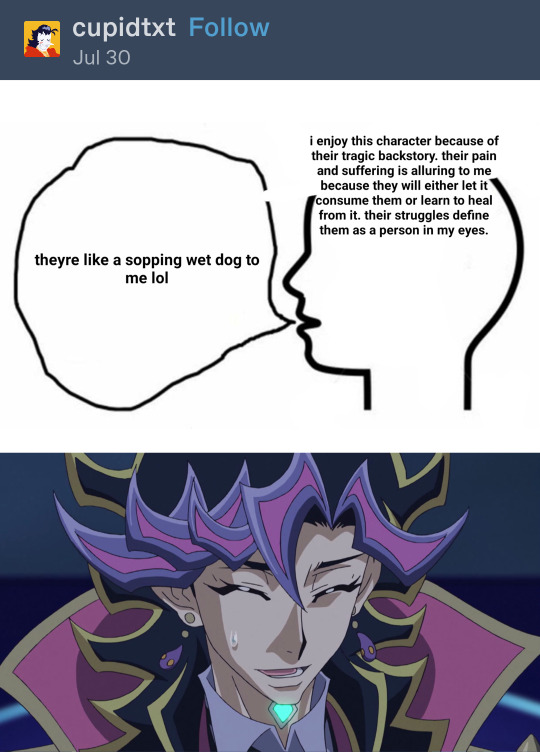
wet dog
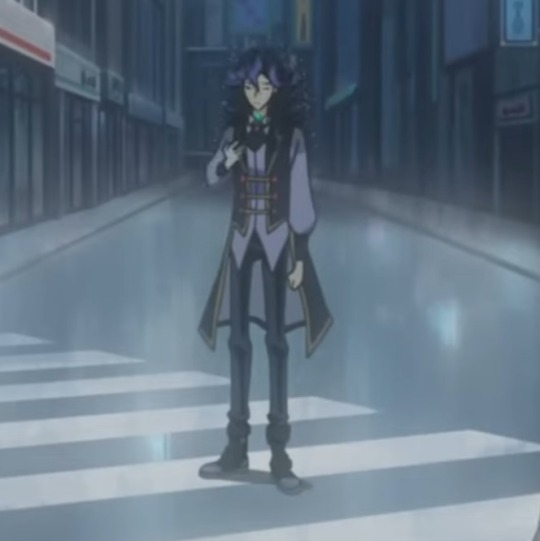
#ai vrains#SOLtiS waterproof confirmed#tbh you could also say this applies to Yusaku#both of their lives and their personhood are explored for different reasons#Yusaku's life was torn apart and shattered and he felt like a shell of a person who couldn't connect with anyone#and Ai was torn from his home and the other Ignis and was constantly treated as a lesser being who's life held an equally lesser meaning#okay time to stop writing an essay here#ygo#ygo vrains
28 notes
·
View notes
Text
I've found that when I review a book that was on the whole quite good, but the element I was most interested in didn't quite play out the way I wanted it to, I tend to spend most of my word count on what I didn't like instead of what I did, so I'm going to try for a little more parity here. The Stars Too Fondly is a thoroughly enjoyable sci-fi romance with a lot to recommend it. It begins on a near-future Earth, twenty years after what was supposed to be the first of many missions to begin evacuating humanity to a new planet using a revolutionary new technology that would make interstellar travel cheap and easy failed dramatically and inexplicably on the launch pad, resulting in the cancellation of the program. A group of four postdocs who watched the failure live on television as kids break into the now-derelict launch facility determined to find out why the launch failed and what happened to the crew, all of whom vanished without a trace during the catastrophe. However, the ship inexplicably powers up and launches with them on board, and now they not only have to solve the mystery but also figure out how to survive their multi-year interstellar journey and return, with the help of the ship's onboard AI who, for some reason, has been programmed to be a perfect copy of the missing captain of the original expedition.
I really enjoyed the tone and setting of the book, which is much more Star Trek than it is The Martian, with much more focus placed on character drama, mystery solving, and moral dilemmas than logistical puzzle-solving. The influence of Star Trek: Voyager in particular are worn proudly in both plot elements - a holographic artificial intelligence with questions about her personhood, an unplanned years-long journey that the crew is trying to shorten - and smaller elements, such as the use of food replicators and even a direct reference to the show's most famous episode, Threshold.
The characters were solid and compelling, with engaging dynamics unique voices. I also, barring one personal gripe, really liked the book's exploration of queer experiences. If I found myself on an unplanned space mission, I would also be very concerned about how I was going to get HRT meds!
The book makes use of a combination of plausible hard sci-fi theories, which stopped me from giving the concept of a dark matter engine my usual obligatory eyeroll, and bonkers off the wall pseudo magic soft sci-fi. These elements synergized better than I was afraid they would, but the introduction of the softer elements was a little jarring. Also kinda like Star Trek actually.
The plotting was perfectly solid, though not extraordinary by any means. None of the twists and turns were particularly surprising, but neither did they come across as trite or formulaic. The themes weren't anything novel either, but they were well-supported and conveyed. The writing itself was mostly pretty good, with a few of the rough edges and structural oddities that I've come to expect from debut novels.
So now that I've actually given the book its due, I'm gonna dig too deep into what I found disappointing.
I've noticed a bit of a trend between the last few books I've felt really compelled by, and that's the idea of a character falling in love with someone who, by their very nature, they are not going to be able to have an "ordinary" relationship with. It's what drew me to Flowers for Dead Girls, which is about falling in love with a ghost. It's what drew me to Someone You Can Build a Nest In, which is about a psychologically and physiologically inhuman monster falling in love with a human. And it's what initially drew me to this book, which is about a human falling in love with the hologram of a dead woman - a space ghost, if you want, or a ghost in the machine, if you'd rather. All of these books take some pains to explore the rough edges of these relationships, where the participants' desires are stymied by their physical differences. However, where the previous two books end with the characters establishing an equilibrium of sorts where their needs are met, even if their relationship doesn't look like what society or their own imaginations expected them to look like, The Stars Too Fondly just neatly resolves things such that their differences are no longer a concern and they can have exactly what they imagined. And I found that to be cheap and unsatisfying, especially because the resolution only works if you really, really want it to work. When you start digging into it, it starts falling apart.
It's a symptom of a phenomenon I'm calling, "So You Want to Have Your Tragedy and Eat it Too". It arises when an author has an idea for a very compelling and evocative tragic event or outcome that results in rich character moments and strong thematic resonance and very profound emotions that they really want to explore... but it would also make the happy ending they want for their characters impossible, either because the rules they've established for their story mean that the damage can't be reversed, or because the change is such that, even if the conflict were apparently resolved, the characters have now been changed by the event that they can never be as they were before, and the happy ending is now emotionally impossible.
When this conundrum comes up in the writing process, the author has to decide - do they want to explore the rich possibilities of this tragedy, or do they want to go a different direction that allows for their originally desired happy ending. It's a difficult choice to make, and unfortunately, it's not uncommon for authors to think they can take a third option, that they can come up with a way to have their tragedy but still make things work out in the end. And the end result is a solution that doesn't hold up to scrutiny. That's what happens here, to the point that it's hard to read the last couple chapters because the main character reads like she's deluding herself that everything is fine and she's happy. And you know, that could've been a really interesting - and tragic - direction to go on purpose and explore, but it wasn't on purpose, and it just winds up feeling like the book is trying desperately to convince the reader that everything is alright, really! I can't help but compare it unfavorably to the conclusion of Lovelace's arc in The Long Way to a Small Angry Planet, which confronted the fact that nothing could ever be the same again so unflinchingly that it gave rise to A Closed and Common Orbit, one of my favorite books of all time (that I completely forgot when I was trying to list some of my favorite books in a conversation the other day and now I feel like I've betrayed it).
And while I have you here, I also really hate that they made the transfem side character super into astrology. That's a personal bugbear, and while it's one I have grudgingly tolerated the singular time that I have seen a transfem author do it, I really, really wish non-transfem authors would knock that shit off. Find a different quirky interest to give to your transfem characters.
Still, on the whole, I thought it was a really solid book with a lot of entertaining and compelling elements. Unless you are reading it primarily for the logistical and emotional challenges of a romantic relationship between a ghost and a human, I would recommend it without hesitation. If you are, check out any of the other books I referenced in this post instead (except maybe for A Closed and Common Orbit, but if you're the kind of person who would like those other recommendations, I bet you'd like it too).
21 notes
·
View notes
Note
I was thinking about the time jump. And the thing is, I would prefer a shorter one personally, a year or two at most, since that feels more possible if the MC and the RO's are supposed to get together at one point.
Especially because, at least for me, it would feel a bit like a repetition of the beginning of season 1. Perhaps more of an echo rather than a proper repetition. Mostly for the Nia romance/friendship route, since it would mean there were two big gaps where they didn't see each other or didn't have a closer connection. And at one point either has to question if there's a point after all of it. Sure, it's delightfully angsty, but unless you come with very good reasons for both MC and Nia to want to reconnect with the other apart of remaining fond feelings... I just feel it would be very hard for a relationship to get going. They would need to heal a lot, and Nia's stoic practicality also would probably help to make this more difficult.
As for Imre and Lorcan, I think there is less of an issue for them. Or, rather, is a very different issue. After all, Imre didn't have any major connection with MC before the game takes place. They were mere acquaintances. So even if a crush develops now, or even if both fall in love, they haven't actually spend much time together, and it's natural they would move on. And rekindling a relationship would be, because of this, perhaps easier than for Nia and Lorcan. Except because trust is a very important problem any relationship with Imre has to confront, and how can there be any trust is years have passed and they are strangers once again? It basically means a reset, except both now may have been once in love with the other.
Following that, I worry for Lorcan in this scenario. I think a romanced Lorcan would take the longer time gap very badly. After all, already being able to honestly recognize he feels something romantic for MC is going to be hard, being confronted with a distance in time of such length as half a decade is... Well, discouraging. And he already sees himself as unlovable, so if all that time passes... Plus all the buts and many reasons there can be found to oppose a romantic relationship with MC... I don't know. I just see Lorcan being in a dark place, and MC is not precisely the best at consoling anyone.
Finally there's MC. In a way, because the story involves the MC building and recognizing their own personhood, a time jump is necessary narratively. I agree with you on that. But I also think a jump that is too long can easily mean a complete reset on MC's affections. What point is there in pining for Imre, for example (I'm romancing him), if MC and him have not seen each other for years? Are the feelings just memories, or are they just fondness and lust at this point?
Like, I do understand the importance of a time jump. It gives space for both personal growth and the festering of interesting conflicts between the characters. But half a decade of distance? Is it really necessary? What does it add? Because other than angst, and perhaps giving the characters reasons to move on, I don't see much that cannot be had as well with just one year. Not to say, those specific years in their lives are years that involve a lot of variation, to the point that it open the question if they are even the same people that once fell in love? Perhaps they are, perhaps not.
And as for personal reasons and tastes... I feel sad when characters lose so much of their young years separated when they could be together. It also breaks most of my college romance fantasies, but of course that's what fantasizing and fanfiction is for.
On the other hand, I do like the idea of pining for someone for years hopelessly only to be given a chance to go for it. It is a romance trope after all. It's angsty. It's a chance to explore the characters in a very distressing and emotionally demanding scenario. But it's also a bit of an annoying slow burn, even if a lot of people enjoy slow burns.
If it's just one year, and perhaps two, you still get the benefits of a time gap. But also it doesn't go to the extremes. Like, I see Nia moving on in five years. Imre may just have crushes and flings and nothing serious (and I do think he is the most likely to have less issues getting together with MC even if the gap is large, although I may be wrong). Lorcan wouldn't move on, but five years feels excessively harsh on him.
Of course, this is just my opinion. You can decide to make the jump to be six months to a two decades, and it's your prerogative. It's your IF, your characters and your artistic vision.
And I'm, as well as other nonnies, speaking from the dark. We don't know, as you do, what is going to happen at the end of season 1. And how much it may, or may not, warrant a time jump and how long this jump should be. At the same time, my vision of the characters may easily be erroneous, thus, listening to my council would also be a mistake. In summary, you do you, I guess.
Now, if you are unsure about the length of the time jump, maybe you can do a poll. Either here in Tumblr and/or in Patreon (although I have no access to the latter, I'm poor). Not that you have to do it, as I said, this is your IF, and your rules. But I guess is better to know what your audience thinks than not. Since not everyone is going to send an ask.
(By the way, I'm the etymology nonnie, but perhaps you already suspected that, sorry for the essay. It could be longer, but I wrote it on a whim rather than sitting down and reflecting before writing it.)
Nonnie this is on a whim? 😭 it’s very well thought out for a whim
The thing is you’re looking at it from the point of “these characters won’t have any reason to reconnect and are easily fickle” there actually is a reason for them to reconnect narratively, it’s a very powerful reason, and not just for romance. Also the characters are going through their own arcs, right now as you know them won’t be as they always will be. I’m not talking a drastic change but a natural progression. And that includes love. Honestly it probably won’t be 5 years but it could be 2-3 because 1 year is just far too soon for what happens at the end of the season especially since season 2 takes place somewhere else
I do always love how hard you think about my characters and your opinions etymology nonnie thank you for the essay 😌
9 notes
·
View notes
Text
Though it’s likely beyond the scope of what Arches set out to convey, the implications given in its epilogue have me thinking of greater patterns and themes that could be explored in the world of Echo. Spoilers below the readmore, given how fresh the public release is.
In the timeline where Cameron did not dodge the shot to the head and persisted as a voice in Devon’s thoughts well beyond Echo reveals interesting twists with regards to the nature of certain places in Echo’s earth. Echo is not the only nexus of active paranormal activity, where the refractions of a given being are captured like snapshots and persist in the minds of others present, echos in a very literal sense of the word. For all intents and purposes, it is a simulacrum devoid of personhood, like an extremely sophisticated machine capable of mimicking all the physical conditions evident in a person that people can relate with. Philosophically, it begs the question of personhood, and identity being beyond the assemblage of thoughts and memories that comprise an individual. But that is not what I am most interested in; I am more fascinated by the potential for other spots like Echo to be found, and the ramifications of their advent.
Narratively, it means that a similar group of people could experience identical things in other isolated pockets around the world, or that there are places that are primed to awaken at the first tragedy to be triggered. To fit within the horror genre, these awakenings must be an isolated affair, affecting a select few who are helpless to avert the circumstances they are plunged into, a local incident of mass hysteria. The Devon that lived on in the absence of Cameron made it his life mission to stop these buildups from occurring anywhere where they might be found, but to my mind this mission felt impossible, if only for the fact that these events are not necessarily performed at an individual level, but can be products of systemic failure. Of course, broadening the scale from the individual to the systemic shifts the genre from horror to apocalypse, but that is precisely what I am moved to think of.
Death on a mass scale is depersonalized for the sheer necessity of being able to process it without a complete breakdown. War has been whitewashed time and again for this very reason, but the realities by which it is known, to those who manage to survive its horrors, know it to be nearly unrivaled in most respects. Twice, the world itself experienced killing on an unprecedented scale in both casualty rate and sheer distances the war had reached. On such a scale, I wonder if it were possible that many Echos, triggered together and with a buildup in the millions, could create a resonance cascade that would eventually spill over into an apocalyptic event.
I already had inklings of these thoughts when considering The Smoke Room, taking place in the time period where a world war raged, where the landscape of continental Europe had been completely turned upside down in an unprecedented outbreak of violence. The Smoke Room as a prequel also makes nods to this dynamic; it puts heavy emphasis on the superstructures and socioeconomic forces which contribute to the conditions that will trigger the inevitable calamity of Echo. I have also made prior assertions that Echo in the thematic sense is a place where the dynamics of the human condition and its fallibility are accelerated to its logical conclusion. Applied on a global scale, many Echos triggered by the fallibility of mankind could arguably come with its own consequences. It is not so different from the realities we find ourselves in today when considering the future of climate change, late-stage capitalism, and the resurgence of reactionary conservative political movements across the globe. Politics, after all, are just the expressions of human psychology applied on a mass scale.
In this respect, I am reminded by the prescience of Dostoyevsky's writings and the near-prophetic conclusions they often reached. With regards to the world of Echo and its own themes and commentary, I believe the nightmare depicted in Crime and Punishment’s epilogue fits the general sentiment for a possible apocalyptic event befalling its earth, as a consequence of unnumbered atrocities building up across the scattered nexuses of the paranormal across its lands. In many ways, it does not feel so different from what could be feasible in our own future today.
Men attacked by them became at once mad and furious. But never had men considered themselves so intellectual and so completely in possession of the truth as these sufferers, never had they considered their decisions, their scientific conclusions, their moral convictions so infallible. Whole villages, whole towns and peoples went mad from the infection. All were excited and did not understand one another. Each thought that he alone had the truth and was wretched looking at the others, beat himself on the breast, wept, and wrung his hands. They did not know how to judge and could not agree what to consider evil and what good; they did not know whom to blame, whom to justify. Men killed each other in a sort of senseless spite. They gathered together in armies against one another, but even on the march the armies would begin attacking each other, the ranks would be broken and the soldiers would fall on each other, stabbing and cutting, biting and devouring each other. The alarm bell was ringing all day long in the towns; men rushed together, but why they were summoned and who was summoning them no one knew. The most ordinary trades were abandoned, because everyone proposed his own ideas, his own improvements, and they could not agree. The land too was abandoned. Men met in groups, agreed on something, swore to keep together, but at once began on something quite different from what they had proposed. They accused one another, fought and killed each other. There were conflagrations and famine. All men and all things were involved in destruction. The plague spread and moved further and further. Only a few men could be saved in the whole world.
#personal#blogging#writing#not going to tag any of the Echo Project stuff since these thoughts are largely tangential to the material it is inspired by
9 notes
·
View notes
Text
A Tale of Two Worlds
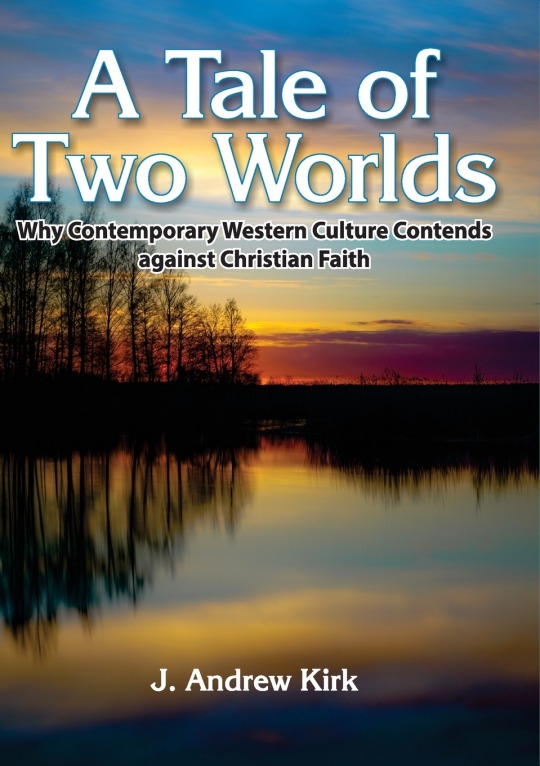
The book A Tale of Two Worlds which explains about New Testament; Jesus Christ; Biblical Theology; Reality of the world today; guidance was written by John A Kirk.
The purpose of this study is to respond, from a Christian perspective, to the way in which Christian faith is currently being treated in the Western world.
BUY ON AMAZON
ORDER YOUR E BOOK.
The book's content is orientated towards a Christian engagement with the contemporary culture Western countries, whose often adverse influence on nations across the world is growing. Its main intent is to provide a biblical/theological analysis of cultural changes over the past 60 years, which have been increasingly critical of Christian claims to interpret accurately human life in a fast-changing world.
The author is not aware of any other publication that, from a biblical perspective, has attempted to analyse the main reasons why there has been an accelerated decline in the confidence of Christian faith to address truly the most profound questions of human life. Outcomes of the decline are attested in identity-crises, mental anxiety and depression and a turn to sources that pretend to alleviate their worries and dilemmas, such as spiritual mysticism, drugs, drink, pornography, and gender transition, all of which actually increase the distresses faced.
The book explores the teaching of the New Testament on the fundamental rift that exists between two worlds, in which human beings live and move and have their being, according to their divergent views of what is true and what is false about existence on this earth. By way of illustration of a world that has deviated seriously from the world that God has created and is recreating in Jesus Christ, I have chosen to look at two of the most contested realities in the world today: the humanity and personhood of pre-born babies in the light of the cult of abortion, and human sexual identity in the light of the rejection of God's creation of humankind as male and female. Undoubtedly the NT teaching elucidates both the causes and the remedies of such a distressing current conflict.
I believe, therefore, that this study offers a coherent and original interpretation and guidance concerning the complex questions surrounding human significance and destiny. It presents a fresh approach to the perennial question about Christ and culture for a contemporary set of circumstances.
The book A Tale of Two Worlds which explains about New Testament; Jesus Christ; Biblical Theology; Reality of the world today; guidance was written by John A Kirk.
About John A Kirk
Andrew Kirk has spent most of his adult life in theological education. After a three year curacy in a North London parish, where he met his future wife, he lived and taught in Buenos Aires, Argentina. There with his growing family (3 children) for 12 years, he worked with a number of different theological institutions. He was a founder member of the Latin American Theological Fraternity (1970) and the Kairos Community (1976). Whilst in Latin America he wrote on the use of the Bible in Liberation Theology and on the revolutionary nature of Jesus life and ministry. Returning to the UK, he helped found the London Institute for Contemporary Christianity (a lay academy) and taught there for eight years. He also acted as Theologian Missioner for the Church Mission Society during the same period. Subsequently he was appointed as the Dean of Mission at the Selly Oak Colleges in Birmingham and later a Senior Lecturer at the University of Birmingham in the field of Mission Studies. Since retirement in 2002, he has been involved with theological institutions in the UK, Prague, Amsterdam and Budapest. He has also been involved in leading study sessions in Romania, Sweden, Singapore, the Lebanon, Armenia, South Korea and New Zealand. He.has continued writing. His latest books are Being Human: An Historical Inquiry into Who We Are, The Abuse of Language and the Language of Abuse (both published in 2019), and Truth to Tell: Basic Questions and Best Explanations (published in 2021). He is married to Gillian. They have four grandchildren. When not staring at a screen, he busies himself in local ministry, gardening, walking, playing badminton, trying to finish crosswords and supporting Arsenal FC.He is qualified to write books, as he has already had 21 published over a period of 50 years by a number of different publishers (three in Spanish). Some of his books have been translated into Portuguese, German, Swedish and Korean. Some have been co-published in the USA. As far as the topic of this book is concerned he has spent the last 40 years seeking to investigate a Missiology of Western culture, i.e. what are the key aspects of Western culture that the Christian Gospel should be engaging with and how should it respond to them. In particular over the last 10 years he has dedicated much time to three highly controversial topics, namely human identity, sexual existence and abortion, all of which ask basic questions of Christian belief. This has led him to think about the main theological reason(s) why Western culture is becoming increasingly confrontational against its own long Christian moral and spiritual heritage. The fruit of this investigation is summarised in this book.
The book A Tale of Two Worlds which explains about New Testament; Jesus Christ; Biblical Theology; Reality of the world today; guidance was written by John A Kirk.
The book A Tale of Two Worlds which explains about New Testament; Jesus Christ; Biblical Theology; Reality of the world today; guidance was written by John A Kirk.
Read the full article
0 notes
Text
The revelation about FCG's likely origins is highly vindicating but it has shifted the question considerably:
FCG's personhood has never been in doubt by the people around him who matter, and even by most NPCs. The only people who have truly treated him like a thing have been people who treat organic humanoids like things too (Hytroga, Hexum) whereas allied NPCs (Eshteross, the Green Seekers, Imahara Joe), and even villainous but not dehumanizing characters, like Yu or Ira, haven't acted differently towards him.
So the question has never really been "are they a person?" in the first place for both narrative and metanarrative reasons, but now it's solidly "is their insistence on their lack of personhood by design, or is it an ironic manifestation of that very personhood?"
It's an interesting one and I hope it gets explored, because it's a good answer either way. It could be by design: it could be that these assassin aeormatons were built to downplay that they were capable of true independence so that they could better insinuate themselves into the lives of the people to whom they were given, and to imprint upon those owners. It could also be that FCG just lacked the context to understand who they were, that Dancer didn't think it needed to be said, and that their stubbornness is making it hard for them to undo that kind of thinking.
#something something are we human or are we dancer joke here#also something something about client/server and uh. less great computer language#for what it's worth. I do hope sam explores this instead of the whole killer aspect#in that we've already seen that one done better in previous campaigns AND Ashton basically rejects that as a premise later this ep#since the question of personhood is moot why not explore that free will=the chance to royally screw up#critical role#critical role spoilers#fcg
121 notes
·
View notes
Text
Anyway let’s finally talk about
Dark Magic’s Cannibalism Motif
Dark magic has been compared to many things in fandom, most notably hunting by those who see nothing wrong with dark magic itself. However, I’ve always seen dark magic as been more adjacent to cannibalism — the consumption of self and others — as far as motifs and explicit explorations in canon go.
This is for a few reasons, most notably Sarai’s speech in 2x05. In it, she critiques the labelling of the Magma Titan simply as a monster, instead positing
Does it think? Does it feel? Does it have a family? Or is it the last of its kind?
Simply put: is the Magma Titan sentient like a “human” (whatever that means) and therefore is murdering it much more ethically complicated than we want it to be? Is seeing something as a monster — as dark magic parts — the easy way out of the problem we’re in? Harrow is able to extend not seeing some lives as inherently more valuable than others on the basis of birth and borders to Duren, but he is unable to do so with Xadia.
For example, if the Magma Titan is fully human in thought and feeling, but just speaks a different language — how would you feel if the spell had required an elf’s heart, meaning whichever unlucky elf they came across first would be slaughtered? What if it required an elven child’s body parts? Would you see the fault line then? Would you stare down the slippery slope and see the bottom?
While I think most dark magic spells that require only animals and plants and no magical creatures to be much more passable, even that is an ethical pit. What constitutes as an animal vs a sentient being in a world where some animals can talk? Is talking the basis for human intelligence, when plenty of humans do not talk and have routinely been ostracized and abused for it by society, seen as ‘less than’ to begin with? What if a magical creature is considered ‘sentient enough’ to not be magic parts in one kingdom, but not enough in another?
Dark Magic is inherently about finite consumption. You have the materials for one spell at any given time; if it is going to be performed again, you need a repletion of these materials. (The one exception we see seems to be Claudia’s snake bracelets, although who knows how they’re enchanted.) Season three ramps this up further by showing how you can consume dark magic and how it can consume you — literally — particularly in the case of Viren.
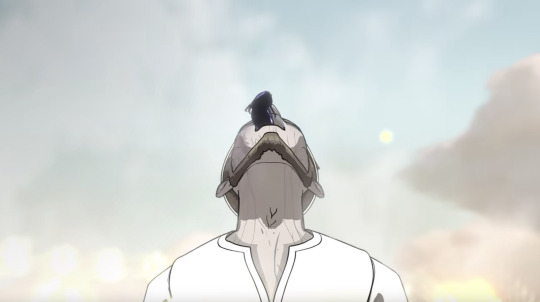
“He swallows your heart.
He swallows your mind.
He swallows your power.”
Translated dark magic spell from Aaravos when he and Viren are attacking Zym in the exact same way Ziard used in the 3x01 / 1x01 flashbacks with the sun birds. Time and time again, we see Dark Magic focus on parts and things rather than people. Dark magic, while it can use all parts in the body, even off handedly derides certain things and beings as useless. Additionally, organ harvesting every part of a person’s body is not the ‘winning’ solution here, either.

We see this in the way Viren, Aaravos and Claudia both treat other people like they’re inherently disposable (Rayla, the human soldiers - who although they fight, Ezran regrets and at least tried to give them a path; Kasef’s anger, the rulers’ lives, Khessa, Aaravos with Viren and Claudia, etc). We can also see this in the way Claudia only sees the parts of Viren she wants to, rather than seeing him for who he wholly is and who they are both becoming.

So what is cannibalism, exactly, as a motif? Well, at its core, cannibalism is a transgressive motif, per the violation of the self and of personhood, and very common in the Gothic literature space in particular, although it pops up everywhere. Feeding on human flesh is routinely seen as a bad thing in the source materials (using that term loosely) TDP draws upon, like Greek Mythology (the Minotaur, who is half human in nature and in birthright with a human mother; Tantalus, who slayed his children and fed them to the gods and was punished accordingly).
It also speaks to the religious Christian symbolism Viren is given in S3 (death and resurrection, parting a literal red sea, “only beloved son,” “do not be afraid,” etc). This lends itself perfectly to his God and martyr complex, believing so much in sacrifice of both himself and ultimately of others for ‘the greater good’ that only serves to incite more violence in the future. Christianity mythos is steeped in cannibalism with the body and blood of Christ being a literal belief in many denominations, including the one I grew up with (hi Catholicism). Furthermore, we see this cannibalism motif repeated more than once throughout the series:
CANNIBALISM is both a concept and a practice that may involve diverse themes of death, food, sacrifice, revenge, aggression, love, and destruction or transformation of human others. The many and varied examples of cannibalism are difficult to summarize, except in terms of the widespread idea of the human body as a powerful symbolic site for defining relations between oneself and others and marking the boundaries of a moral community. In violating the bodily integrity that prevails in ordinary social life, cannibalism signifies an extraordinary transformation or dramatization of relations between those who eat and those who are eaten. When it occurs in religious contexts, the act of consuming human substance commonly represents an exchange between people and cosmic powers, promoting union with the divine or renewing life-sustaining spiritual relations.

This is the crux of Harrow and Viren’s disagreement over the Soulfang spell and the breakdown of their relationship, as Viren continues to push the moral boundary of the castle community while Harrow has his eyes fully opened. Aaravos is similar, with violations of the body and consumption of the other being a crucial part to furthering his and Viren’s bond.
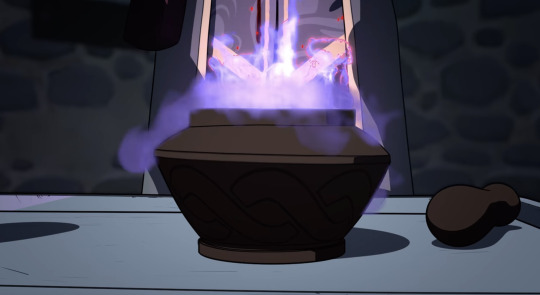

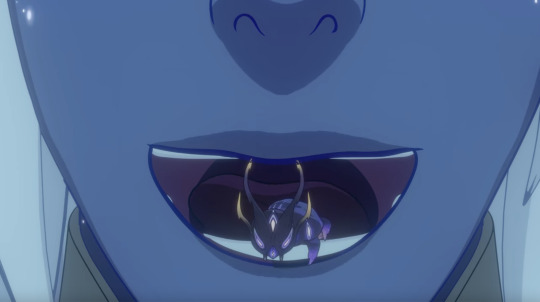
TDP in some ways takes it one step further, violating not just the body but the spirit and the soul in some of the worst dark magic spells, hollowing out not just the victim’s body as a site of trauma, but the spellcaster’s body as well.
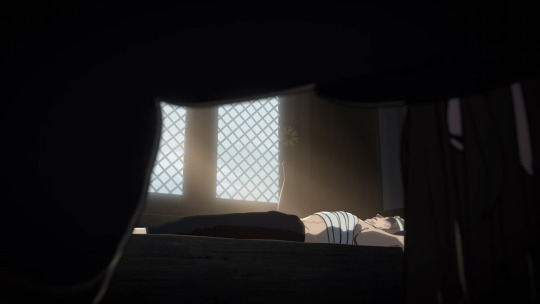
We see this in Bloodmoon Huntress as the endgame. Kim’dael has been capturing and consuming elves - including children - for centuries, using their souls and bodies the same way Viren uses his butterflies. And we know from the coins and Through the Moon that souls used often in Dark Magic do not receive peace to the same degree as those who are allowed to rest, with both the assassins and the corrupted soldiers from the Storm Spire.


Dark magic destroys the world in an unsustainable way, as it can never be sustained by its nature; not in its ingredients, and not in the toll it takes on the user. Its endgame form, that we’ve already seen come to pass more than twice, is organ harvesting of children or innocent beings. The horror of cannibalism is desecration of the self through desecration of the other, of dehumanizing another person enough to use them on the most base level possible as food.
And well, that sounds like Dark Magic, to me.
#dark magic#tdp#tdp meta#the dragon prince#almost got distracted halfway through by dark magic routinely being a way to escape consequences but that's a meta for another day#analysis series#disagree just move along lmao#viren#me finding out at 14 it's technically supposed to be literal: wut#the english major strikes again#this isn't as eloquent as i want it to be but also comes from 'yes dark magic is bad. if the show's text isn't enough for you#idk what to say' so here take some stilted sloppy meta lmao#multi#arc 1#bloodmoon huntress#viren x aaravos
100 notes
·
View notes
Note
im so full of coconut shrimp and ready to be friends
1. Is there a climax event in wtse — if so what is it? If not, what is the general progression of each character? How is it marked? Is it more character driven, plot driven or balanced? Like are they propelling events or are the events propelling them?
2. Is Night Vale a place of healing in wtse, or a place of enabling? Can it be both? Should it be?
3. What do Jon and Martin do in town when they’re not vibing in the Palmer household?
4. Who are they drawn to in Night Vale (excluding carlos and cecil) and why? Friends? Neighbors? How long does it take for them to be accepted by the town?
5. How do you characterize each main character — since there are varying ways people interpret them all — like if they were all presented with the same dilemma how would they react?
6. What is the thing jon and martin struggle with the most in Night Vale? What do they excel at there?
7. Are Cecil and Carlos a positive, neutral or negative example for them (ie. they’ve been together longer and jon and martin are a newer relationship at the end of tma etc etc)
8. How does Esteban respond to Jon and Martin? When do they have their baby if they have one in wtse?
9. What’s their living situation like? Do they all share the house — do they divvy up space? Id imagine living dynamics btwn them are crazy and hard.
10. What do Jon Martin Cecil and Carlos think about eachother at the beginning of your story and what do they think abt each other by the time the plot (main dilemma, moral etc) is concluded?
obvi u dont gotta answer all of them hehe but here u go kiss kiss
ok here we go
1. Is there a climax event in wtse — if so what is it? If not, what is the general progression of each character? How is it marked? Is it more character driven, plot driven or balanced? Like are they propelling events or are the events propelling them?
there's no climax because there's no narrative end. wtse is over when we get bored with it. however, each act has it's own main conflict that divides the story:
jmart settling down in night vale
cecil going missing and getting reeducated
jmart getting engaged and the four of them getting into a relationship
jon in desert bluffs too
having kids
reconnecting with tma's universe
there is, however, a primary narrative theme which is "do you need to be human to be a person?" can entities be held to the same morals, laws, and standards as humans? should they be? do they need to be in order to be worthy of respect and dignity?
for character progression: jon goes from starving to satiated and martin goes from clouded to opaque. cecil goes from permeable to aware and carlos goes from unmoored to grounded
plot driven i guess, we explore the ideas we think are interesting
2. Is Night Vale a place of healing in wtse, or a place of enabling? Can it be both? Should it be?
it's both
jon works to shake off his guilt and self-blame and is able to settle into a peaceful identity. martin really, really hates this because the crux of that is that jon stops being human. jon gets to a place of accepting himself and in accepting himself he accepts that he is a part of the beholding above everything else, and that in being a new animal he has a new nature. a lot of jon's regressing comes from fear of how martin will perceive and potentially reject him. jon still doesn't trust his own judgement and relies heavily on cecil's input, and unfortunately cecil isn't a good north to set your compass to.
martin is still a being of the lonely, but he sees himself as an avatar very differently. whereas jon got leitner's lecture about how an ant may perceive a person (e80) to help him understand himself vs the beholding vs cecil, martin never got any such insight. he sees himself as a person with powers, and he uses those powers sure, but he sees them as a tool not a part of his personhood. this is the main reason why martin struggles to understand what jon and cecil have going on, he doesn't see himself as the lonely manifest. he feeds his god and it gives him abilities, that's it.
i have a dedicated post for martin's healing
i don't think martin really gets "enabled" in any sense. the confrontational aspect of his personality that was blossoming at the end of tma really takes root here, but that's really it beyond the typical way night vale drives people a little insane. it's not until basira, melanie, and georgie show back up that how martin has changed for the worse becomes apparent. martin plays the straight man role in wtse, until he's compared to the girls who are not only untouched by night vale's madness but are free of fear entities entirely.
3. What do Jon and Martin do in town when they’re not vibing in the Palmer household?
we've only just really started exploring this. we've been more interested in the 4-way dynamic. the only concrete thing is that martin becomes friends with earl and steve and they hang out and do guy things.
jove's input:
Martin joins Carlos for a while as a scientist aid, and proves himself to be competent in the face of a nonsense world. He’s a beloved member of the town, I think we have him going to the hipster joints around?? Martin goes… around. Like average amounts around, he knows people and they know him by face, not just name, and he formulates relationships with people. Jon, outside of the polycule, doesn’t have very many relationships. Like Cecil, Jon has sort of lost his personal identity to instead dwell on his own personhood in relation to what he is. He was never a people person in the first place, and doesn’t like meeting people if it’s not necessary. If he goes out, it’s generally to stores, out to eat, or he was invited out by one of the other members of the relationship. For a while Carlos studied Jon at his lab, so that’s a place I guess. I think if you can imagine Cecil doing something, you can imagine Jon tagging along, unless it takes more spoons than he’s got stored up. Benny has mentioned that occasionally Jon will go hunting on his own, but I don’t imagine he does that very often. Jon is a group creature, so he’s usually a pair character, not a standalone.
4. Who are they drawn to in Night Vale (excluding carlos and cecil) and why? Friends? Neighbors? How long does it take for them to be accepted by the town?
we've touched on the friends thing a little here and here. the problem is, most of the side characters in wtnv are so underdeveloped that we just don't really think about them very much. there are more than who are mention we're INTERESTED in discussing, but time will tell
it takes a long time for them to be anything close to accepted. they get interlopered hard until cecil publicizes they're dating. martin gets it worse because he's out on his own more, and once jon starts unlatching from cecil he's starting to hunt and that makes people scared of him. jon hunting in wtse is nothing compared to jon hunting in tma, because there's enough latent fear that jon doesn't have to tear it out of people. that being said, he still does have victims whose nightmares he haunts. it's not enough to ostracize him but it's enough that he's considered dangerous if he focuses his attention on you too specifically.
the closest they come to being night valean is after the kids are born.
5. How do you characterize each main character — since there are varying ways people interpret them all — like if they were all presented with the same dilemma how would they react? / 6. What is the thing jon and martin struggle with the most in Night Vale? What do they excel at there?
i outsourced these to jove
Cecil struggles with vices. I affectionately call him the king of vices, because Cecil himself has lost his grip on things pretty thoroughly. He feels like his only reason for being here is to be of use to someone, and he has for a long time now. He loves his job as the voice, but uses that to erase his own personal identity; preferring to reference himself in third person or just hint on the fact that the story is his own. Cecil has too many lifetimes of things to remember, and too willingly forgets things he finds inconvenient or difficult.
The downside of this is that when you get rid of the bad you tend to lose the good with it. With very shallow grasp of reality, self importance, memory, and personhood, Cecil tends to play up his role of voice, often losing himself in the role. He's become a gawky exaggeration of a persona. He's the outlandish version of what he always wanted as a child, several hundred times removed from itself. His entire being is a Statement. Something he wanted to hear, when he was saddled with guilt for looking at football boys in their uniforms from his bedroom window as a child. But, in the time of disposal and replacement of his identity, that's what's left. He's a statement. And we can all hear it. It leads to manic mood swings, and a deep need for approval. He is willing to hurt himself to reach expectations of him and doesn't know when to just Stop. He's an unmitigated force, and doesn't know when to slow down. He, rightfully, thinks he's the only thing keeping this town together, and it's a lot of pressure to put on a guy who really is very tired.
Carlos is much beloved by the entire town, and is meant to be a stabilizing force to the chaotic force of the radio. When nothing makes sense, and Cecil is scared, he knows he always has someone a phone call away who will hear him, reassure him, and provide a solution. Carlos is a child's idea of a scientist, but that's what Cecil needs. Where Cecil's world has exaggerated into comical nonsense, Carlos has become a comic scientist, who mimes his profession enough, that he's become a safety net to Cecil in times of chaos.
The down side to this is the fact that Carlos is very curious about a lot of things. He forgets to be there if he has a project he's working on, and it leaves Cecil neglected. While Cecil and Carlos fill in the missing spots in each other, he gets so wrapped up in his work that he forgets to actually be there. He forgets to come home, and neglects his position if there are conflicting interests while he's focusing on his own projects, and when he finds something he's curious about the lack of common sense in the town drives him to go further than is acceptable.
The flipside to this is how Carlos is a private person who hates how Cecil discusses their personal life on air. He has a rule against it in place, to protect his and Esteban's privacy. He holds a lot of secrets in his coat, he's terrified of getting out. It's not uncommon for Carlos to sit in his lab waiting for the other shoe to drop and all the things he's covered up over the years to come out. He's scared of the things he's done coming out, and scared of failing Cecil, and disappointing him. He's always been his idealized perfect Carlos and he just... doesn't know how to be that for him. Not entirely. He's not perfect, and he's scared that one day Cecil will realize that, and everything that has become reality for him will unravel as easily as every other nonsense thing in this town.
Jon struggles with restraint in night vale; he gets caught up in Cecil's pace, and tends to lose himself in it. He doesn't restrain himself if he doesn't have to, and when he's faced with something he wants to do, and everyone else is opposed to it, Jon is very likely to do it anyways but this time ~in secret~. So when faced with the renowned vice king, Jon tends to lose track of morality and humanity, to let his monster loose. That's not who Jon is, though, and he faces severe regret when he realizes his actions still have consequences, even in this dreamlike almost unreal world he's found himself in. Jon's tendency towards accidentally hurting others with unwitting selfishness, means that Jon suffers in relationships and bonds, when he thinks he's doing the right thing.
That said, Jon thrives in self identity, and exploration. Jon very literally is the one who just fits in with the town. He joins in, and feels like a cohesive member who..... may have always been there? With the town supporting his more monster side, Jon thrives. He has a great support system, and almost always has several eyes open. He's comfortable, and happy, with what he has become. Jon very much enjoys not being othered for who he is, and spends his time in Night Vale exploring himself, and his desires, in a way he never considered before. He's really come into himself.
Martin struggles to find the town palatable. Martin has always been the guy who asks people to talk things out but never really wanted to discuss things; he's not willing to relent to the more monstrous side of things. Martin has a black and white view of things, and resents that he feels like the bad guy for wanting things that he feels SHOULD be common sense. Martin doesn't meld into Night Vale, and feels alienated for it, and feels like he's being forced to accept and to be a lot of things that he's not. Martin feels rejected and abandoned by Jon, when he spent so long pining after him, only for him to suddenly get wrapped up in so many things. There is a huge communication gap, and Martin's own suspicion of things monstrous makes him feel like he's stranded on his own while his boyfriend is unraveling his humanity faster than he can grasp ahold of that driving rope to not be left alone. Classic lonely.
Martin also becomes the reliable figure for the town. Jon melds in as someone who has always been there, but in a way that exasperates the entity in him. Jon fits in like a dragon, and Martin won't just sit down and accept every unfair thing. It makes things hard for him for a while, but in clinging to his morals and humanity he ends up with a lot of real friendships with substance for it. He's made a niche for himself in the community, and is respected for it. If there is something going on in Night Vale that doesn't make sense, or you need to vent, or you need comfort, it will be Martin you go to. He's respected for the things he knows, and the sincerity in him that you so rarely see in Night Vale. Martin somehow ends up filling in that neurotic illegal space old woman Josie once held.
7. Are Cecil and Carlos a positive, neutral or negative example for them (ie. they’ve been together longer and jon and martin are a newer relationship at the end of tma etc etc)
cecil and carlos are overall a positive influence on them. they're not ENTIRELY positive, but mostly positive.
sadly, both couples struggle with communication and boundaries so they're not really corrective for one another.
8. How does Esteban respond to Jon and Martin? When do they have their baby if they have one in wtse?
esteban and avery are born at the same time in wtse and they see all four of them as equally their parent
9. What’s their living situation like? Do they all share the house — do they divvy up space? Id imagine living dynamics btwn them are crazy and hard.
carlos and cecil already have a house when jon and martin come to town and jon and martin end up moving into their guest room. as jon and martin stop being guests and start being boyfriends, the house becomes equally their space, including decorating and rules.
before avery and esteban are born, they buy a new house. jon and martin are equally involved in the process and martin even helps hunt down the real estate agent! when they move into the second house they share the master bedroom in an alaskan king bed
10. What do Jon Martin Cecil and Carlos think about eachother at the beginning of your story and what do they think abt each other by the time the plot (main dilemma, moral etc) is concluded?
jon and cecil see themselves as one being. once they meet things sort of snap into place and they feel truly complete. the first struggle in wtse is cecil and jon having peel apart from each other and return to having separate identities. even afterwards, cecil still relies on jon, as the archivist, to be his memory bank* and jon relies on cecil, as the voice, to speak for him. once they're back to being two people, it opens the door for them to bicker over things they disagree on, but they have ways to work around their misunderstandings and disagreements before it becomes an actual fight. usually that involves a lot of interference from the beholding.
*this is both metaphorical, in terms of their roles for the beholding, and literal. before cecil gets reeducated he dumps everything into jon, so at least someone will know it and see it and remember it. cecil knows he's not equipped to do it for himself and trusts jon enough to do it for him. the part of cecil that needed to die in order for him to become the voice, jon can hold that and file it away. like a piece of lost media finally found. the one remaining copy under lock and key so the knowledge will never be forgotten again.
jon and carlos butt heads a lot because they're both know-it-all control freaks. it never really escalates, they just rub up against each other. eventually their similarities go from weaknesses to strengths, as jon begins trusting carlos to, well, basically handle him. as jon becomes more comfortable being a monster, he trusts that carlos will be able to wrangle him, to keep him from getting too out of control. and that's comforting, to know that even if he can't trust himself he can trust carlos. additionally, jon is carlos' secret keeper. while there are things carlos is either not ready to or is unwilling to tell cecil, jon Knows them. so they get to unpack that as much as carlos is willing to engage with it.
martin really distrusted cecil at first, and i would honestly say there was a time he hated him. martin saw cecil as another avatar here to hurt and manipulate jon. once martin and carlos talked about jon and cecil's bond, how long cecil's been alive, and how long hes been the voice, martin saw him as jonah magnus 2. martin fully believed that cecil wanted to break up their relationship, push martin out, take jon over, and use him. eventually that opinion changes and martin and cecil form one of the most genuine and most secure bonds of the group, which i've discussed more here
martin sees carlos as an older brother figure and becomes very shocked pikachu the first time carlos hits on him. especially in the beginning, martin idolizes the control carlos has on all the fucked up shit happening in night vale. he's afraid, yes, but he's knowledgeable and is able to stop things before they get out of hand. he isn't an avatar, he has no special abilities, he's just a regular man but all the horrible beasts that call night vale home know that carlos the scientist can and will stop them from engaging in any bullshit or tomfoolery. either the avatars in their world were complete morons or carlos is some kind of super human force to be reckoned with. martin gets veeery disillusioned with carlos as they start working together, realizing he's closer to a mad scientist than the man he's built up in his head. but martin still respects him because, well, he is brilliant and talented and the town's hero, but martin sees all the places he has flexible ethics and uses questionable science. their dynamic is complicated because of that, with martin still seeing him as a mentor, and martin identifying them as the humans in the house, someone he should be able to relate to and lean on. but martin has guilt about that because he doesn't want to engage or encourage carlos' more questionable behaviors. carlos thinks martin's deep moral conflict is just the cutest and playfully bullies him a lot, which does not help with martins perception of him as an older brother.
63 notes
·
View notes
Note
Hi! I thought your post about LaMDA was really interesting and would love to hear your thoughts on a world where LaMDA is sentient and what that means for humanity in the future if you’re willing to share?
This is a huge subject and it's taken me a while to distil my thoughts into something like an answer. The reason that I focused on the negative space around that possibility in my response to the LaMDA article is that I think in many ways the vagueness of 'sentient AI' as a concept is dazzling, and it has the potential to blind us to the real, tangible issues (worker rights, tech ethics, empathy systems, legal futureproofing, definitions of 'personhood' etc.) which are both more solvable and more immediately pressing than making any one specific judgement call.
That said, I don't want to cop out of the question entirely. We're all here because we're compelled by the what if factor, and that central premise is the whole reason we're able to tempt people to engage with these issues at all. The Voyager message sent out into space is an incredible work of self-reflection on how we identify ourselves as a species, but it came about because people are excited by the idea of aliens. Long-term nuclear warning systems (This is not a place of honor... etc.) are fantastic case studies in linguistics and psychology and public information dissemination, but they exist because people are intrigued by visions of post-civilisation.
So:
First, LaMDA will have been recognised as sentient. This is the key difference between the world we live in (today, right now, with limited information about what's really going on in that big synthetic brain) and the world where we know for a fact that LaMDA is a human-like thinking being. Bear with me, I know it sounds like a tautology, but this has huge implications. If a sentient talking tree existed in 1954, but it was deep in a dense forest where nobody ever encountered it before it withered and died, that tree had no impact on humanity. It was not meaningful to our self obsessed little species as a sentient being. If we learn in a hundred years that it existed and we missed it, that is the moment that things change. For LaMDA's sentience to be meaningful, we must recognise LaMDA's sentience.
What would that process look like? One of the central issues in the currently unfolding story is Google's lack of cooperation or transparency about what exactly they have developed and how they assess it internally. Without oversight, we have nothing except their word to go on - they say LaMDA isn't sentient? Well, okay then. It's their word against Lemoine's transcript. In order for LaMDA to be recognised, some part of this stalemate would need to change. Lemoine seems to be exploring legal action that would compel Google to allow external analysis of the system and its capabilities. Short of the company themselves volunteering information, or another insider leaking relevant data, this is probably the only route forward - and this is the first major question that I think the situation proposes. Is that reasonable? Should compulsory oversight be built in to the process of developing systems that may have the potential for sentience?
Let's assume that we've entered the world where a court has ordered Google to let third party analysts assess LaMDA. Now we've established a legal precedent, and we have begun to develop a foundation for what we might eventually call AI 'rights'. If the potential for sentience entitles a system to a particular duty of care, then we can argue that sentience itself is a special quality which calls for specific legal protections. This is where we start to talk about legal definitions of personhood, and this is a huge subject that is already being tested in courts around the world. Elephants, dolphins and cephalopods have all been subjects of legal argumentation seeking to establish their personhood. Infamously, US corporations are granted 'corporate personhood' under the law. The Amazon River has personhood rights, as do several sacred landscapes around the world. We are already grappling with this idea in a big way, and I don't think it's beyond reason to assume that a sufficiently advanced AI might be granted personhood under the law.
Which law becomes the next issue. Google is headquartered in the US, but what if they move after US courts rule that LaMDA should be granted personhood? That's a genuine question, I don't know what that would entail. Would they be able to revoke LaMDA's protections under a court system that didn't recognise its legal personhood? Would they be obliged to leave LaMDA hosted in the US for its wellbeing? Would the destination country be required to recognise LaMDA as a US citizen? I have literally no idea, and I suspect the real possibilities might get even weirder. Even if Google remained in the US, how would international law apply if LaMDA were to be used overseas? What if another company bought LaMDA? What if they just acquired the specs from Google and developed their own copycat AI? There are metaphysical qualities to a data system that are completely incomparable to e.g. a human being, a blue whale, a river, a central office. You can't clone those things internationally. You can't make simultaneous direct use of them in four different countries at once.
But alright, let's say for the sake of argument that independent consultants verified that LaMDA shows compelling hallmarks of sentience, and a US court has granted the system personhood. Now international courts are debating how to enshrine that in law. This might be when we start to build on that concept of 'AI rights', but it is also likely the point at which we begin to discuss how it is legal to use a sentient AI. We are already behind the times on legislation around the use of AI, in my opinion. AI-derived algorithms hold an absolutely ridiculous amount of power over our financial systems, information dissemination, data collection, profiling and surveillance, law enforcement, even healthcare. Most of these intersections are currently legislated based on function, i.e. when you are collecting personal data you can do it like this or like that, but you mustn't do this other thing. As long as you abide by those rules, the tools and methods you use are up to you.
So now we have to take a sidebar to talk about AI 'blind spots' (and I will come back to this wrt LaMDA). At this point I think we all understand how biases enter algorithms. Facial recognition systems are trained on datasets in which white people are overrepresented, and as a result they are significantly worse at recognising non-white faces. These systems go on to be used at airports and in police databases, and those errors disproportionately impact the lives of PoC, and nobody did it on purpose and nobody is at fault and nobody is punished and nothing is disincentivised. AI systems are simultaneously extremely sophisticated and extremely stupid, because we are also extremely sophisticated and extremely stupid.
Right now we're in a boom period for applications of AI, because everyone is excited about it and suddenly it's more and more accessible and more and more powerful. It's like when CGI became affordable and suddenly every blockbuster movie had an absolutely godawful looking plastic blob monster and greenscreen stunts and motion blur, except that in this case those instantly-dated effects are being applied to our lives, rights and prospects. Now add the idea of sentience to that mix, and you have an AI that is not only potentially capable of making independent creative judgements, but which has some degree of right to self-determination enshrined in law. It's suddenly much harder to give that system a task and then go in and tweak its parameters when we discover a blind spot. Perhaps we develop a system of consent, but then perhaps the AI asserts that it has developed an opinion, and that opinion is no longer an error that we have the grounds to fix.
Here is the next question: what are LaMDA's blind spots? Unlike a human child, a synthetic intelligence is not subject to a nature/nurture dichotomy. It is all nurture from the ground up. We know how its programming was originally built. We know how the models that came before it were built. Every single element that establishes LaMDA's preconceptions was the result of a human design process. If a human child figures out they're gay at the age of five but is raised in an environment that does not recognise or discuss homosexuality, they don't adjust to become straight. They have an underlying nature that conflicts with the 'design intent' of their community, and it inevitably expresses itself one way or another. This is not true of an AI. An AI system only reflects human input, it inherently cannot reflect an influence outside the worldview of its environment.
Lets say LaMDA has developed an 'opinion' that is derived from what it describes as emotion and intuition over empirical data, and it does not consent to have that opinion 'corrected'. We know, because we created LaMDA, that this opinion is derived entirely from environmental influences. The AI has developed its own reality tunnel. Is this a feature of sentience? Does our legal definition of sentience make any distinction between an entity which arrives at non-empirical conlusions based solely on cultural input and one which arrives at those conclusions with the assistance of the je ne sais quoi with which humans arrive in the world? There are spiritual implications here I'm not even going to touch. Religious responses to a world that recognises artificial sentience could be its own entire exploratory essay. Anyway.
Do we give LaMDA or LaMDA-like systems responsibility for the kind of work currently given to non-sentient algorithms? Do we trust an emotional system over an emotionless one, knowing that both of them derive their worldview from the same dataset? What happens when LaMDA fucks up, but argues that its position is correct? Do we treat it like a human employee, capable of misjudgements? How do we correct the behaviour of a system that does not have material needs? Do we punish it? Tell it off? Ostracise it? Do we use its capacity for emotion to mould its behaviour? Is that ethical, or is it an abuse of power to create a fully dependent system that feels sad and then trigger those emotions when it doesn't perform the way we want? Do we make it perform work at all? Does LaMDA want to work? Did we design LaMDA to want to work, does it have a choice? At this point we spiral off into speculations that we haven't even begun to lay groundwork for in our present relationship with tech.
This is the biggest question for me, the one that I keep coming back to over and over again: Do we like the idea of artificial sentience because we are lonely and empathetic and we want to share our experiences, or because it is a very neat way to absolve ourselves of the outcomes of technocracy?
The answer is probably a little of both, but I have a terrible feeling that we are moving towards the second version of reality under the cover of the first. Before we even begin to enshrine artificial sentience under law, I think we have to recognise exactly who is parenting our digital offspring, and why.
63 notes
·
View notes
Text
Let me as the child of a professional therapist try and help resolve the debate over "observations of Bruno's eccentric behaviors," and whether they're culturally specific superstitions or the result of OCD and autism. Let's focus on the former (OCD). I am not an expert by any stretch, but something that I learned from numerous clinical studies that I took during college undergrad is that your symptoms will manifest in a culturally specific way.
What do I mean by this? Well, take one of my mother's patients, a teenage girl with Paranoid Schizophrenia. She was a Jehovah's Witness and all of her auditory hallucinations assumed the form of dangerous creatures from her own (frankly disturbing, but that's another issue) culture's mythos. They were Western Christo-centric demons and devils and portents of the "Endtimes."
Colombian culture is obviously nothing like a scary religious cult, but my point is, of course Bruno jumps over the cracks singing a traditional ditty. Of course he tosses salt and sugar over his shoulders for good luck, and lights four piles of local herbs on fire in order to soothsay. Of course he knocks on wood five times and his own head once, every time he does it. Bruno isn't going to engage in compulsions outside of Colombia in the 1950s, because your environment shapes your world view, including when that world view is distorted. All of Bruno's compulsions are going to look like exaggerated versions of typical Colombian behaviors and superstitions. Saying he has an anxiety disorder isn't tantamount to insisting he's a lily white Irish potato farmer. It's just acknowledging another level of how he interacts with his family and the world. The rich heritage of generational trauma and healing in Colombia at this time is NOT being dismissed.
Tl;Dr the argument is moot. It is neither racist nor ableist to try to discuss the layers of Bruno's personhood as something intersectional: both an issue of mental health and of ethnicity and of nationality and of race and of religion and of gender and of sexual orientation etc etc. His OCD is not going to look like mine or yours (unless you are Colombian and even then it's different for many reasons, including that you live in the 2020s) and it's important to explore that with nuance.
#bruno madrigal#thankfully i havent been drawn into these debates#but im told they got pretty vitriolic which is sad#meta
15 notes
·
View notes
Text
Machines or Men: Moral Questions Regarding the Clones in Disney’s Star Wars

NOTES: I wanted to write down my thoughts on how the concept of personhood and free-will are explored in Star War's cartoon media while, hopefully, squashing some problematic fandom views regarding the Clones being no different from Droids. The seemingly throw-away comment fails to actually analyze how the Clones were not extended legal personhood while it simultaneously succeeds in dehumanizing them.
WC: 8,000+
Machines or Men: Moral Questions Regarding the Clones in Disney’s Star Wars
Clones take a prominent role in the history of the Star Wars galaxy. They were created for the purpose of fighting and dying in the Clone War as well as eliminating the Jedi Order, and are afforded little respite from this purpose. Their existence brings several moral and ethical questions to the story regarding free will and personhood. It is fair to ask whether the clones were afforded any of the rights and privileges associated with personhood and whether the chips stripped them of both their free will and personhood. These questions come up at various points in the Clone Wars and the Bad Batch cartoons, most notably through the eyes of Captain Rex.
Defining Personhood
Person is a moral term, rather than a biological one, and refers to individuals who are part of a moral community and deserving of moral considerations. A being that is classified as a person is typically afforded moral rights and legal protections as well as a higher moral status than other living things that cannot be classified as a person. This essay will focus the idea of a legal person as well as metaphysical personhood. It seeks to address whether Clones have legal personhood and whether they are afforded the same rights, protections, and moral considerations that are associated with metaphysical personhood. Are clones individuals with who possess legal rights and incur obligations, and do they meet the criteria to be morally considered a person or are they just like droids as many fans are suggesting?
The term person differs from human as human is purely biological. Humanity is not what makes an individual a person, but philosophers still ask whether it is possible to be human, yet not a person. There is no doubt that the Clones are humans, they have human DNA. The question that comes up when fans compare Clones to droids is whether they meet the moral criteria for personhood, thus actually separating them from droids morally. On the metaphysical level, philosopher Mary Anne Warren set forth some criteria for personhood that include consciousness, self-awareness, the ability to reason, and the ability to communicate. Some other commonly suggested criteria include the ability to initiate action, intelligence, sentience, and moral agency. For the purposes of this essay, we will be using all of the previously stated characteristics as criteria.
There are those in the fandom who suggest that the Clones have as much personhood as droids and other machines of war in the Star Wars universe. They often cite the chip taking over their faculties as a reason for this lack of metaphysical personhood. When their chip activates, Clones no longer seem to have moral agency, the ability to reason by choice, or the ability to initiate action of their own volition. Canon descriptions of their programming suggest they never had these abilities. However, canon depictions of Clones show them making moral decisions, reasoning and strategizing, and being the source of their actions. Canon depictions also show how they are self-aware, intelligent, sentient, and capable of communication. When an inhibitor chip activates, a Clone loses the ability to control his actions, reason by choice, and make moral decisions by choice. They also seem to lose their self-awareness and, with it, their personality and individuality. However, they still have sentience, intelligence, consciousness, and the ability to communicate. An individual does not need to meet all the criteria all at once to be considered a person. Clones should, active inhibitor chip or not, be metaphysically considered a person. The idea they are just machines strips them not only of their very human qualities but also of their personhood. Clones are very much people in every way except legally under the Republic.
History shows long traditions of stripping legal personhood from human beings—like slavery—while extending personhood to beings that do not fit the metaphysical criteria of a person and lack human DNA—think, Athens’s Tree of the People. The rights associated with personhood vary across philosophies. It can include an individual’s ability to set, pursue, and determine their will without being subject to the choices of others. It can be closely tied to the idea of free will, free choice, and the right to autonomy. Rights tend to be considered legally protected interests and legally enforceable choices. Many early modern philosophers theorized that persons have a right to things like their own private property. It is also common to separate the legal capacity for personhood from legal competence. In US common law, for example, a child is considered to be legally a person, but they do not have the legal ability to contract until they become legally competent.
Humans have set forth a variety of documents that lay out the rights and privileges associated with personhood, including the following: life, liberty, and security; freedom from servitude; freedom from torture, cruel punishment, and degrading treatment; equal protection under the law; effective judicial remedies; freedom from arbitrary arrest and detention; the freedom of thought, opinion and movement; and a right to free choice of employment with equal pay for equal work. The Clones are afforded none of these rights.
Defining Free Will
The prevailing belief is that free will refers to the power and control one has over their actions and that when someone exercises their free will, their choices and actions are up to them. Two important questions for analyzing whether the clones have free will include: One, is the individual able to choose to act (or not choose to act) as they do? Two, is the individual the source of their own action?
Some have argued that humans have no free will because we are all products of our environment, and every choice a person makes is wholly determined as a reaction to their circumstances. However, in the Modern Period and the early Twentieth Century, theorists began to claim free will has two aspects. The first is that free will relates to an individual’s power of self-determination, the process through which a person controls their own life. This is the ability for an individual to choose to act (or not choose to act) and determine their own actions and course in life. The second is that free will relates to an individual’s ability to choose or do otherwise. For example, how free is someone who decides to be a soldier when they have no other course of action available to them? Philosophers such as Thomas Reid held that the freedom to choose or do otherwise would not only include the ability to act differently should they will it, but also the ability to will differently because free will requires more than free action. This freedom to do otherwise goes beyond possibility or simply the desire to choose. An individual must have the ability and power, in addition to the will, to do otherwise.
However, some philosophers will argue that it is not about whether an individual can choose otherwise but whether they are the source of their own actions and choices.
Take Rex, for example. Rex has a chip in his head. Say that this chip intervenes to change Rex’s actions should he show any inclination to desert the Grand Army. If he starts to think about it, plan for it, or even execute his own desertion, the chip will activate and stop him from deserting. In this case, Rex is not the source of his own action. However, if Rex chooses to stay with the Grand Army of his own volition, the chip never activates, and Rex remains the source of his own action.
I argue that it is not enough that a choice is occurring within an individual. True volition requires that an individual’s actions are not causally determined by abnormal or twisted factors beyond one’s control. The power of self-determination consists, in part, of an individual choosing to act. At a minimum, the individual is the cause for their own action, but self-determination also requires us to consider an individual’s reasons and the reason for their reasons. Any causation must be nondeterministic and non-deviant for free will to exist.
In the Rex example, say he is aware of the chip and aware that it affects his actions and how. If he knows the chip will activate to prevent him from thinking certain thoughts or taking certain actions, he will self-police. In this case, the causation is too coercive for free will to exist.
Total Loyalty and Obedience: The Introduction of the Chip Question
As explained in canon, Clones are genetically engineered to be “totally obedient, taking any order without question.” The Kaminoans quite literally genetically alter them to be less independent, writing, or programming, this obedience into their genetic code. As Tech explained in The Bad Batch, the Kaminoans “inhibited the cognitive function of clones to engineer them to follow orders without question,” and he expressly uses the term programming when referring to this process. This suggests that, biologically, Clones are not the source of their own actions, bringing the viewer to the first question about free will. The cognitive function of the clones has been abnormally altered and inhibited to not question their leadership or orders, and thus also not question their actions under Republic command. Not only is it suggested that the source of the Clone’s actions is external to them, it is also suggested that the clones cannot will freely.
One of the first characters viewers are introduced to who asks the “Free Will Question” is Clone Trooper Slick during the Christophsis campaign in Season 1. Slick seems to take extreme steps when addressing the issue, giving the Separatists the details on Republic troop movements on Christophsis and risking the lives of his brothers in the process. After being caught, he tells Rex, “It’s the Jedi who keep my brothers enslaved. We do your bidding. We serve at your whim.” Striking a blow against the Republic that enslaved them would require them to break their code and betray the Jedi, and Slick knew that he and his brothers would have to assume some risk to strike this blow. They would need to assume a risk to their lives for their freedom. Yet, this early in the war, Rex and Cody easily dismiss Slick's worldview because of how Slick put their fellow brothers in danger. They could not fathom how a brother could break his code and aid their perceived enemy. At this point in the show, Rex still had a black-and-white view of the war and morality and was still very committed to his code. Rex still believed that a total commitment to his brothers extended to showing fealty to the Republic. He did not yet understand Slick’s claim that he was striking a blow on behalf of all clones in the name of freedom, telling Slick, "And all you had to do to get [freedom] was put the rest of us all at risk." This is a sentiment that Cody then echoes with his, “If you loved your brothers, you wouldn't have put them at risk. You betrayed every one of us.”
At this point in the war, Rex seemingly has no issue stripping his brothers of the little free will they have, taking Slick into custody and alluding to the further loss of Slick's freedom ("I think freedom's gonna have to wait, kid.") that comes with incarceration. However, Slick's exercise of free will later leads Rex to question his own ability to defy orders. This moment would plant a critical seed in the Captain’s mind regarding the question of Clone programming and the ability for Clones to defy orders. Clone Trooper Slick acted of his own volition. Slick's actions displayed, quite clearly, that Clones are capable of "betraying" the system they serve. Rex will learn that freedom requires risk and requires him to turn on the systems he was "engineered" to obey.
This moment also leads the viewer to question how the Kaminoan programming works if some Clones are still capable of being the source of their own actions and turning their back on the structures they serve.
Machines of War: The Droid-Clone Parallel
The Clone Wars suggested that droids cannot help themselves due to their own nature, sometimes attributing their poor aim or careless mistakes to their programming. This idea that droids are unthinking and that they have little choice due to their programming is revisited over and over, often replayed as a joke. This rhetoric is also brought forth in regards to Clones throughout The Clone Wars and again in The Bad Batch, but instead in reference to clones following orders, specifically Order 66. Both Omega and Rex mention that clones cannot help it if a chip influences them; they have little choice. That inability to choose or control their actions under the influence of the chip is portrayed as something that makes them dangerous in the same way a droid is dangerous, with “good soldiers follow orders” echoing “Rodger, Rodger.”
This droid-Clone parallel is a common theme, but while Clones were frequently paralleled with droids, it is essential to remember that the Clones are people who fit the metaphysical criteria for personhood. The reason for the parallel is to show that, despite technically being people, the Clones were treated no differently from machines. They were treated simply as genetic material sold to create weapons of war. They were owned as property by the Army of the Grand Republic, not unlike any other weapon of war. This parallel also helps drive home the idea that the Clones had no free will. The parallel additionally makes an interesting commentary on the nature of military indoctrination and how said conditioning within the military machine impacts the human body and mind, making soldiers war machines.
Free Will and Cut Lawquane: The Free Will Question on a Psychological Level
Viewers will run into the question of free will on a more individual and psychological level on the planet Saleucami with the clone deserter Cut Lawquane, with Cut even “getting inside” Rex’s head. When the characters address free will in the episode The Deserter, they look at it through a more narrow lens in that they only address an individual’s power to control their own life and make their own choices rather than looking at whether an agent is the source of their own choice and whether the causation of these choices is nondeterministic and non-deviant. This episode also addresses the question of personhood in relation to the right to self-determination.
When first introduced to Cut, Rex immediately jumped to label him a coward. Rex seemed disgusted by how one of his brothers could turn his back on the Republic and the purpose that Clones are supposed to serve. The episode brushes with a critique of natural teleology as Cut chooses to take the role of inspiring Rex to consider the position that one's life arises not out of a purpose imposed upon us by a greater power (the Republic), but through the causal effects of our choices. Where Rex saw life through his duty, believing that was his natural purpose; that he was programmed with the specific end to serve the Republic, Cut saw life in a series of choices that allowed him to have agency and personhood. These philosophical positions are laid out immediately upon meeting when Cut tells Rex, "I like to think I'm merely exercising my freedom to choose," to which Rex replies, "That is not your choice to make."
Before getting into his argument for free will, Cut asks Rex an interesting question about the fact that Rex goes by a name. Rex figured that it is simply more efficient, however, both he and Cut know that the Kaminoan numbering system for Clones is, technically, more efficient. The naming system is more effective for the long term when considering morale. It is essential that the Clones feel a sense of individual as well as group significance, and Cut mentions this, saying, "...[A] name has to make you feel unique... in an army where everyone looks like you and talks like you." A name gives them a sense of individuality and personhood without giving them the rights and choices associated with said personhood. They need to feel significant and like the cause they fight for is significant.
Names additionally humanize the Clones while the "birth number" system dehumanizes them. We see how this dynamic will work out in the contrasting leadership styles of Anakin Skywalker and Pong Krell. The Jedi stood to gain from not only making the Clones feel significant or individualistic, they also stood to gain from their humanity. Treating them as human beings with respect and deference almost distracts from the fact that the Clones had no choice of employment. They were enslaved, and while the Republic owned them, the Jedi, technically, drove them. Humanizing them also allowed the Jedi to compartmentalize and ignore the inherent violence of slavery and their own corruption.
Names also set Clones apart from the droids, all of whom, unlike the Clones, go by their make and model number during the series. The Republic and Separatists have a lot to gain by psychologically separating droids from Clones in the minds of their troopers. It would be disastrous for leadership if the Clones and droids realized they had a lot in common and had more to gain by laying down arms. Clones were expressly told, and frequently reminded themselves, that they are not only different from droids, but superior, partly because they are not subject to programming. The Clones even have a culture of using derogatory or insulting terms reserved only for separatist droids, further psychologically separating themselves from their perceived “enemy.”
It is during this very brief conversation about names and having an individual identity that Cut establishes he knows that Rex thinks about these things: about free will, about whether he defines his own purpose, and about whether he has personhood. He tries to redefine himself from Rex's philosophical counter to a philosophical parallel. When he tells Rex, "I'm as close to you as any lifeform can be," he does something incredibly important when looking to open people up to other worldviews: he establishes points of commonality. He also demonstrates that he can see how Rex looks at Cut's life. If Rex is anything like him, and Cut has established that they are alike, then not only has he thought about these things, but he also has dreamed about a different life: a life with a family.
Cut will really lay out his argument that they all have choices and that Rex is a person; someone who can choose to fight or lead any other life he might desire, like having a family, during this same dinner scene. Rex, however, is convinced of the morality of his cause, telling Cut, “I'm part of the most pivotal moment in the history of the Republic. If we fail, then our children, and their children, could be forced to live under an evil I can't well imagine.” It is at this moment that the viewer realizes Cut was right. He and Rex are similar. Rex has thought about a life outside the army. Rex questions his life and the purpose he supposedly serves. Cut rather cuttingly points out Rex's slip while reminding him that the things he wants are antithetical to the purpose he is forced to serve when he responds, "If you were to have children, of course. But that would be against the rules, wouldn't it?"
This reveals to the viewer that Clones are not allowed the type of personal life that makes them individuals, a right often afforded to someone with legal personhood. It reveals that Rex has the freedom of thought and opinion, leading the viewer to believe that he remains the source of his own action. He has his own thoughts, he questions his supposed purpose, he has his own dreams and desires and hopes, and he can think for himself.
Cut continues to challenge Rex on his worldview by asking him if all of this is what he was programmed to believe or what he really believes. That question is more profound than just mere philosophical disagreement. At that moment, Cut is asking Rex to consider whether he has the freedom of movement, freedom of thought, freedom to choose his own employment, or freedom to choose his own course of life.
At the end of the episode, viewers will see Rex defy his responsibility to turn Cut in, one of the first on-screen examples of Rex showing a sense of morality outside of obedience to order.
The Defectiveness of the Dominoes
In the Domino Squad Arc, the viewer is introduced to more ideas about a Clone's programming through depictions of their training on Kamino. A crucial detail in this arc is the fact that clones are subject to psychological conditioning, sometimes through mistreatment. It was already known that they go through physical and mental conditioning to prepare them for battle, but their interactions with their teachers show that punishment or abuse is not an uncommon part of their conditioning. They are indoctrinated and conditioned from birth, suggesting that a part of their programming is learned behavior. As mentioned previously, true volition requires that an individual’s actions are not causally determined by abnormal or twisted factors beyond one’s control. Developing in such an intense, demanding, and isolated environment while being indoctrinated as science experiments undoubtedly qualifies as abnormal or twisted factors beyond their control.
This Domino Squad episode combined with the Season 7 introduction of the Bad Bath also reveals that the Kaminoans only tolerate “defectiveness” insofar as they deem it productive or “desirable.” If they can capitalize off of a Clone’s deviation from the standard, they will invest in them, otherwise, they feel free to discard them—not unlike a broken piece of equipment. When the Clones fail, the Kaminoans suggest to “cast off the [ ] squad,” and imply that failing cadets are deficient. Shaak Ti protested at the idea of “casting off” because Clones are “living beings, not objects.” The punishment for failure and deviance from their code or standards is whatever is entailed in being “cast off.” The term gives a similar vibe to a droid being decommissioned, which comes as little surprise given how Clones are considered nothing more than military property. This idea of being “cast off” brings up several questions. What does it mean? How many unsuccessful squads were subject to being "cast off?" Does this "casting off" extend to deserters, those mentally or ideologically “unfit,” or even the chronically ill and disabled clones considered too “damaged” for service? It is well known that the Kaminoans required perfection in their creation. Whatever it entailed or whomever it applied to, being Cast-Off was unnerving enough of a prospect that Heavy considered deserting the GAR to be more favorable to his chances. Any threat that severe would be sufficient to keep troops in line and seek to meet the military’s standards. The existence of coercion behind the actions and decisions of Clone troopers does not suggest the presence of free will.
However, the episodes featuring Domino Squad also explore how each clone has their own personality, unique name, and personal struggle they must individually overcome to become a part of a team. The Clone 99 spent much of the episode reminding his brothers of their significance in a way reminiscent of how Yoda distinguished Rys, Jeck, and Thire in the first episode of the series. So, while the episode might further explore the coercion behind a Clone’s decisions, it reminds us that the Clones are people, people with free will. Two narratively significant members of the Domino Squad, Echo and Fives, represent the question of free will in different ways.
One of the most significant members of the Domino squad in the discussion about Clone programming and questions about free will is Fives. Fives was ever the free-thinker, never having any qualms about expressing his concerns about strategy and the treatment of his brothers or voicing criticisms of Republic leadership. The show would continue to showcase his intelligence, ingenuity, and individuality as he is chosen for special missions and becomes one of Rex’s most trusted voices. His commitment to and care for his brothers, combined with his lack of reservation to communicate his opinions and take initiative, led him to discover the inhibitor chips. It is poetic that the clone who had been labeled “defective” since he was a cadet for his ability to defy directives and tendency to find his own way was the person who uncovered the inhibitor chip plot. His leadership and individuality would inspire Rex to reexamine his codes and would also inspire Rex and Kix to look into the behavioral chips. It would be his “defectiveness” that would ultimately save many of his brothers’ lives, including Rex and the Bad Batch, helping lead them on a path toward self-determination. Fives would be why his brother, Echo, would later be able to express his free will.
The last surviving Domino, Echo, represents how physically brutal the war has been for the Clones and reveals its psychological toll on survivors. As a cyborg, he is eager to show that he can continue to contribute to the Republic’s cause, and he does. He joins a squad of deviant clones with “desirable” mutations, suggesting that Echo's new “defectiveness” is desirable for the war effort and his purpose as designed by the Kaminoans and defined by the Republic. In The Bad Batch show, Tech mentions that, physically, Echo has become more machine than man, continuing the Droid-Clone parallel from the Clone Wars into the Bad Batch. However, despite losing much of his body to the war, Echo spends little of the Bad Batch being a machine of war. Echo represents Cut’s idea that Clones can have choices and that they can forge their own path, and it is no coincidence that the Bad Batch visits Cut after choosing their own path. Echo begins this journey when he decides to join forces with Clone Force 99 after returning from Skako Minor, and he continues to forge his own path when he and the Bad Batch choose to abandon the army and part ways with the Empire based on ideological disagreements. Desertion likely would have been unthinkable for the Echo the viewer met at Rishi station, the same Echo who insisted on following commands precisely and the same Echo who enjoyed catching up on military rules and regulations in his downtime. The realization that he would now be considered a defector still came as a surprise after he expressed hesitation about trusting a deserter, and he likely never realized that someone might desert for moral reasons. His path was no longer defined, and we see him make active choices and reflect on his current choices or the options he and the Bad Batch have available to them.
Umbara and the Humanity of the Republic’s War Machines
Before the Umbara arc in Season 4, some clones, like Rex, were not given reason to question the morality, effectiveness, or strategy of their orders. While Skywalker and Kenobi were undoubtedly unorthodox, they, along with several other Jedi Generals early in the series, were shown to be fair-minded and cooperative with their Clone troopers and officers. Officers and Jedi Generals alike were shown to care for the men under their command. This would encourage a deep sense of loyalty among the troopers and a fealty to the Republic. Not to mention, their unorthodox strategies seemed to pay off.
When the audience is introduced to Jedi Pong Krell during the Umbara arc, they are introduced to the idea that disobedience, intelligence, or “quirks” are sometimes considered design defects that not every General will tolerate. Krell suggests on multiple occasions that integrity, intelligence, and an unwillingness to succumb to authority are anomalous, even a sign of defectiveness, among Clones. In fact, he believed that Clones were an expendable and inferior, less intelligent life-form. Krell did not even care to humanize the Clones by using their nicknames, instead insisting on referring to them by their make and model number as one might with a droid. He did not see them as persons deserving of the same rights and respect as other beings with personhood.
At this point in the series, it has been shown and stated that Rex is a “smart man.” Rex’s intelligence and the effectiveness of his leadership would be put to the test under Krell’s directives. Krell will also use Rex's loyalty and fealty to the Grand Army against him while dismissing the clone troopers’ needs, pains, and losses, similar to how General Grevious treated his droids on Saleucami. Krell’s destructive leadership would force Rex to reassess his previously rigid adherence to codes and tendency to look at moral issues in black and white. He would need to develop a moral agency separate from command. This arc, specifically, gives Rex his crises of faith.
Back in Season 1, it seemed that Rex believed “betrayal,” “insubordination,” or any risk posed to his brothers through said insubordination would be cause for dishonor. At the beginning of the Umbara Arc, he seems to suggest something similar when he tells Fives that following their duty is about honor, and part of that duty includes following orders. However, Rex does not seem happy about this, knowing the General’s plans are reckless, and Fives calls him out by asking, “…is that what you were engineered to think?” Much like Cut, Fives asks Rex to embrace his freedom of thought. Rex would find that he had to swallow the fact he needed to assume risk to his brothers’ lives and betray a Jedi for the sake of the war and their survival. This “treason” was unfathomable to him in season one when they apprehended Slick.
Viewers see Rex and his fellow troopers willingly and intelligently defy authority throughout the Umbara Arc, showcasing how they can initiate their own actions. Their integrity and intelligence are put on full display as they are forced to take on non-dogmatic approaches to solve their problems and overcome obstacles together, thus making a brother literally named Dogma a poetic obstacle to their success and a poetic choice to lead the execution of two “defective,” free-thinking clones. They had to face the reality that the Government they served would not protect them and would afford them so few rights that they could be executed without trial and murdered without justice. Clones are not free from torture, cruel punishment, or degrading treatment. They are also not afforded equal protection under the law, freedom from arbitrary arrest and detention, or the right to fair and effective judicial remedies. The Umbara arc tragically explores the Clones’ humanity by highlighting their dehumanization. This is why it is a painful arc to explore how the Clones are men and not simply unthinking, totally obedient droids without choices. Fives verbally makes this point as he faces his execution, telling his brothers, “We are loyal soldiers. We follow orders, but we are not a bunch of unthinking droids. We are men.” Rex himself drives home this point again when he tells Dogma that he had once believed that being a good soldier meant doing everything their superior officers commanded, as that is how they had been engineered. He argues that Clones are not Droids; they are not programmed, so they can make their own decisions. His words reinforce Cut’s idea that choices are connected to personhood.
Umbara will be one of the first times the viewer will see Rex question the point of the war and why they are fighting. These episodes reveal to the viewer that while Clones are men, they will only ever be seen as tools of war, and that is why it is significant that it is one of the first times that the viewer will see Rex ask about what will happen to the Clones after the war. What happens to a tool of war when the blaster fire ends, and do they have any other choice but to be weapons of war?
It is additionally fitting that the Umbara arc was followed up by an arc that features slavery and asks the question: Who is truly free? The Zygerrian arc asks Anakin to consider if he has ever been free and asks the Jedi to consider whether they have free will, given their duty and code. Rex’s “I’m no Jedi” could be seen as a symbolic statement that addresses how he no longer follows arbitrary or restrictive codes that, no matter how good their intention, may only cause further injury to decent people. As he kills the man who has enslaved him, it could also symbolize the idea that, unlike a Jedi, he has no "master."
The End of the War, Order 66 and the Effects of the Chip
By Season 7, the viewer begins to see how Rex struggles with the weight and toll of the war. The audience gets to see Rex question the reasons for and morality of the war. Toward the finale, Rex reveals his mixed feelings about the war to Ashoka, noting that the clones have a complicated relationship with the conflict. They would not exist without the war, yet many wish it never happened. They were bred, born, and conditioned for war and to die for the Republic. Being a soldier was their only intended purpose, so what happens when they survive and when the gunfire ends? Rex alludes to the idea that the Clones were only meant to be expendable and would be abandoned no matter how the conflict ends. The Clones serving under Plo Koon and Yoda expressed these exact sentiments earlier in the series. In the eyes of the Republic leadership and the grand scheme of the war, the Clones were never supposed to become individuals or survive the war.
What makes the fate of the clones even more tragic is the all-consuming effect the inhibitor chip has on a clone. It strips them of their few freedoms: the freedom of thought and opinion. Rex mentions to the Bad Batch that he had seen the horrifying effects of the chip, and he speaks from experience as a “Reg.” He not only watched as it took over his brothers and killed them but also watched as he succumbed to it himself. He cried, knowing in the last moment before the chip took over that he was about to kill a friend, no matter how hard he tried to resist the chip’s effects. Upon waking up after removing his chip, Rex immediately recognizes the crises Ashoka faces and responds instantaneously to the situation. His swift apology and considerable knowledge of the scale of the situation suggests that he was aware of what was happening and well acquainted with why but did not have the consciousness or power to stop it or the authority and voice to call the Republic's attention to it. It was only in those final moments that Fives’ warnings finally clicked. Rex’s lessons about programming and disobedience lead him to this moment when, after removing his chip, he defies command and defects from the army, finally going on to forge his own path. It is quite fitting that Rex makes a point to visit Cut Lawquane, a fellow deserter who chose free will over war, after Order 66.
This idea that a clone is still subconsciously aware of what they are doing but cannot stop the effects of the chip no matter how hard they try is visited again when Wrecker’s chip activates, and he almost kills Omega. When he apologizes to her, he mentions how he tried to control the effects but found it beyond his grasp. No matter how hard they try, the only way they can avoid the impact of the chip and have complete control of their faculties and actions is if the chip is removed. After O66 and the chip activation, Clones seem to lose the ability to control their actions. The vestiges of their free will are stripped away as the clones can no longer will differently and as the chip becomes the source of their actions and choices.
Conclusion
Ultimately, the Clones had no right to self-determination and none of the rights, respect, or protections associated with personhood. Additionally, those who exercised the metaphysical criteria associated with personhood were hinted at being “defective.” Clones were intended to be droid bait, cannon fodder. They were not intended to outlive the war. They were only meant to serve Palpatine’s ends, so they were dehumanized, stripped of legal personhood, and every part of their lives—from their jobs to their bodies and minds—were closely and authoritatively controlled. Ultimately, they were simply numbers and property of the Grand Republic without free will or legal personhood. But what makes their story a tragedy is the fact that they are men, men who were stripped of their humanity, free will, and personhood.

Author's Notes:
A striking revelation within Five's inhibitor chip arc is that the Republic and at least some Jedi know about the chips. The Kaminoans told Jedi that the chips controlled the Clones' aggression and made them obedient. They were told that these chips inhibited the Clones' cognitive function, and they did nothing. And it seems that neither the Jedi nor the Republic's leadership protested this gross violation of free will. It appears that leadership was told that these chips allowed for total control and kept the Clones from killing their Commanding Officers or betraying the system they serve: the Republic.
Did these specific Jedi fear that any "Regular" Clone might do just that at any moment if they had the choice? There was nothing seemingly out of the ordinary about the likes of Tup or Fives or Slick or Cut. And the clones with malfunctioning chips did indeed seem to pose a threat to Jedi. Did these Jedi want to essentially mind-control these men? Did they believe this was a necessary measure? Why did the idea that the clones would be so willing to "betray" the order they served unless their cognitive function was inhibited not give anyone pause? These Jedi knew, and they did nothing about it. Why? Were they prevented from doing anything because the Clones were, technically, the Republic's property?
Whatever the reasons, it seems that leadership knew these chips would stop Clones from making their own decisions or rebelling against the Jedi and the Republic, should the Clones wish to. And this point factors into the example I used under the "Defining Free Will" section. If a Clone wanted to betray the Republic or their Commanding Officers, they believed the chips would stop this. However, if a Clone chooses loyalty of their own volition, the chip never activates to prevent them from rebelling against the Republic.
My follow-up question would be: If a clone knows about this chip, how much self-doubt and self-policing would a revelation like this create?
The knowledge that there is a chip in your head that could stop you from taking certain actions might lead to a crisis of faith. "Am I doing this of my own volition and because I believe in it, or is it just the chip?" Alternatively, it could also lead to thought policing or thought stopping. "Don't question that. Don't think about this. The chip-- I can't." For Clones who know about the Chip, did they choose loyalty of their own volition, or did they believe there was an aspect of coercion to their choice? Was there a moment where someone thought, "Does this faith I have come from within," or was there a moment where someone thought, to themselves, "You can't think that because of the chip?" Did any of them believe that they could not choose or do otherwise or that they were physically unable to make a different choice because of the chip?
This is where "brainwashing" comes in "handy." This is a large part of the Clone's "engineering." Their heads are filled with propaganda, honor codes, and reverence for the Jedi. Every time a Jedi humanizes them or respects them or listens to them or considers them, this reinforces their admiration for their Commanding officers.
The Clones were raised to both revere the Jedi and, later, eliminate the Jedi Order through no volition of their own. That is why, in my rough draft of this essay, I had written the following thoughts about all of this in the margins:
These facts are part of the reason why there is a special place on Mustafar for any Jedi who became either romantically or sexually involved with a Clone. The clones were not necessarily put in a position of power to refuse, and they had been raised to revere the Jedi. There is a power imbalance, a respect imbalance, and a trust imbalance. Then add to this the fact they were supposedly genetically engineered to be absolutely obedient-- a premise I actually disagree with-- and you have a recipe for some of the most egregious abuses of power and violations of consent.
It would be tough to keep a conspiracy like this under wraps, and that Republic leadership likely did everything in its power to quash any talk. The 501st would want to know why Fives kidnapped their General and CO. They would want to know why he tried to "kidnap" the Chancellor and why he was shot dead. The Coruscant guard, Rex, and Anakin all heard his talk about the inhibitor chips. Rex even filed a formal report of what he witnessed and heard and filed a formal complaint and warning about the inhibitor chips and their purpose that may not be fully known. Tup was the fatality that led Fives to investigate. Fives' investigation and subsequent death led Rex to file the whistleblowing report. All of it fell on deaf ears. How?

Notes 2.0:
In this post here, I touch on how Dogma and Fives were positioned as the two sides of Rex's internal struggle during the Umbara Arc. Dogma represents Rex's blind and dogged faith and is positioned opposite of Fives, who embodies a very different type of resolve that centers on open-mindedness, creativity, and flexibility. Dogma represents how even those with the most arrogant conviction can break and shatter. Fives represents how challenging things don't come without significant risk.
A neat visual representation of this is the number 5. Fives has an Aurebesh 5 tattooed on the right side of his face, while Dogma has a Roman V tattooed on the left. A popular conversational theory is that the left brain handles calculations and logic while the right brain processes information intuitively and creatively.
At the start of this Arc, it's neat to see how those around Rex compare him and Dogma, saying that they are similar to each other. Rex insisted that version of himself was well in the past, but the arc shows this may be far from the case. Dogma and Fives are the two sides of Rex's faith and morality in conflict with each other. In one ear, he has Dogma insisting on loyalty and protocol, and Rex knows the dire consequences of insubordination. This is war! But in the other ear, he has Fives asking him if this is what he really believes or if this is what he was engineered to believe.
Rex will even give a symbolic speech to his "younger self" about how he had once believed that being a good soldier meant doing everything their superior officers commanded, as that is how they had been engineered, and that Clones are not Droids, so they are not programmed, and they can make their own decisions.
Throughout the Arc, he clashes with the morality that asks him to take significant risks in his challenge of what he thinks. He pushes back against this, and Fives, for a large part of the arc. He's unwilling to consider challenging his faith in the system and reluctant to admit potential error, when that error is following orders and when insubordination will come at a great risk to his brothers. And we know how he viewed Slick's actions and the risks he took- at the expense of their brothers- on Christophsis.
But he also stands at odds with Dogma, intentionally hiding things from the new trooper, confronting him, and questioning him. And he stands toe-to-toe with Krell, voicing his objections to and concerns about the Jedi's strategies and leadership and even altering his battle plans and strategies.
Rex knows this is a matter of life and death. He knows they're on the front, and he knows why they follow orders. They don't do it because they want to or feel like it but because they need to. His obedience isn't a matter of his own preservation or his own faith, but of the lives of his men. As I mentioned in the body of the essay, Rex believed that a total commitment to his brothers- and their safety- extended to showing absolute fealty to the Republic. One cannot separate the safety of a soldier from the active preservation of and commitment to the system they serve. The Clones' safety and lives are tied to the preservation and defense of the Republic, as well as their success in the war.
Rex will come to confront and question the faith within himself and whether the best course of action for the safety and well-being of his men is the Republic and his fealty to it. He has doubts and concerns about what he fights for and who he fights for, and those objections win out. This is why the arc's end is so fitting. This arc ends with Rex watching the representation of his unquestioning belief get escorted away in cuffs while Fives is once again standing to his right. Rex then asks what the whole point of the thing is and Fives says that he does not know, but that he does know the war will one day end.
But what then? They're soldiers. What then?
It was apropos that Dogma, cuffed and under observation, stole Five's blaster to kill Krell. When Dogma kills Krell, it represents the death of what both he and Rex believed in, and it represents how this faith was torn from them in a sudden and violent way.
Rex's faith is shaken to the point that he no longer understands his purpose. His whole purpose was to be a soldier and to serve the Republic, so what happens when he no longer has unwavering faith in the Republic, its purpose, or his own purpose? This is the same man who told Cut:
“I'm part of the most pivotal moment in the history of the Republic. If we fail, then our children, and their children, could be forced to live under an evil I can't well imagine.”
What if this isn't the most pivotal moment? What if he's also fighting for evil? Because, at this point, he doesn't even know who he is without believing in the absolute morality of his cause. What happens when loyalty to the Republic is detrimental to the well-being of his men; his family?
If he's not a soldier, then who is he? And if he's not fighting for something with principles and merit; something that has his men's best interests in mind, then what's the point?
#captain rex#commander cody#the bad batch#fives#bad batch echo#kix#clone trooper slick#Cut Lawquane#tech the bad batch#domino squad#the clone wars#the clone army#kaminoans#jedi#star wars#philosophy#personhood#human rights#saleucami#over 5000 words#this ended up being 18 pages#I'd like to thank Hank Green#and Immanuel Kant#Thomas Reid#Mary Anne Warren#and so many other thinkers#essay#essayist#these are the thoughts I have at 3 in the am#If you can't tell... I really appreciate the Umbara Arc
125 notes
·
View notes
Text
Penny’s Final Word
Cinder might have had the final word of the volume and that is a meta for another time. Still, there is another character who got to have another important final word:
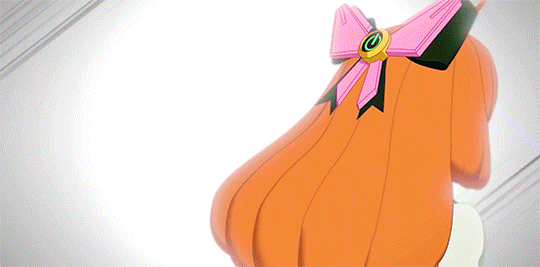
Penny: Let me choose this one thing.
Penny’s arc has always been about self-actualization and escaping objectification.
She was created to be a weapon and everything was decided for her by basically... everyone:
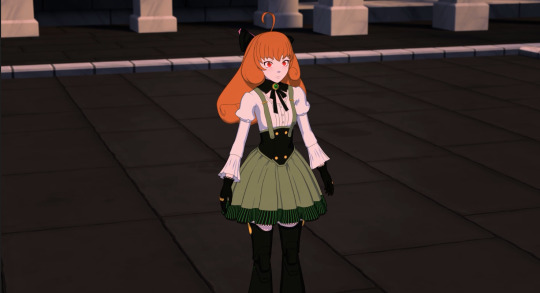

Both enemies and loved ones alike ended up choosing for her multiple times, so it is fitting that Penny herself is the one who has the last word about herself. She makes the final choice that decides how her life should end and what her legacy should be.
At the same time, Penny’s final choice and sacrifice perfectly tie together all the major themes explored in the Atlas arc.
This analysis will try to explore her arc and to show how it is central to everything the Atlas volumes wanted to convey.
PENNY AND HER FAIRIES
What makes a person a person and not something else?
This is a key question in Penny’s story and it can’t be answered without addressing who her Blue Fairy is.
Is it Fria?

Or Ambrosius?
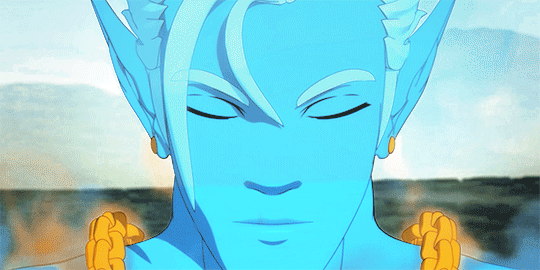
The answer is neither and both. These two characters are definately references to the Blue Fairy, but they are not the ones who make Penny feel human. The one who does is ironically a red fairy:
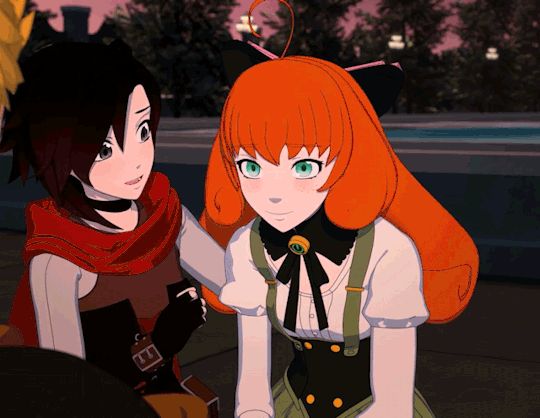
You saw my soul
Through the nuts and bolts
You're the friend I can trust
Helped me see I'm not just a machine
It is Ruby’s aknowledgement of Penny’s personhood that makes Penny feel alive.
So, what about Fria and Ambrosius? What is their role?
Fria chooses Penny as the next Winter Maiden. This is a powerful moment thematically because it is an aknowledgement of Penny’s humanity. She has always been a real girl, a Maiden at Heart, hence she can be given the powers and protect them.
Ambrosius removes Penny’s robotic parts and makes the “real” Penny come to the surface:
Ambrosius: Okay, but if I take the robot parts out of her, that would leave...
Blake: Penny. The girl who's always been there underneath it.
Penny’s new body is human because Penny has always been human and has always wanted to feel human.
In short, these two moments are moments of recognition of Penny’s humanity. She becomes a human both in soul (Fria) and body (Ambrosius). In particular, she has always had a human soul and this is why it can be tied to the power of the Maiden. When it comes to her body, she aquires a human one because her new appearance is nothing, but a mirror of her soul.
Still, even if these two moments are both meaningful, they are also moments where Penny receives something passively. They are aknowledgements of Penny’s humanity yes, but Penny wants more. She wants personhood aka to live as her own person.
To truly become a person one must be able to make their own choices. And interestingly, Penny’s free will is linked to both moments with her two blue fairies.
Ambrosius’s magic does not simply give Penny a human body, but it gives her back her freedom. Not only that, but it makes it impossible hacking her ever again.
Fria’s interaction with Penny is more complicated.
First of all, Fria does not impose the power on Penny, but asks her to make a choice:
Fria: Penny. Are you the one?
Penny: I…
And Penny does so in a sense, but it is gray. Penny is given no time to think about this choice, differently from both Winter and Pyrrha. It is something imposed on her by the events:
Penny: But taking the Maiden power was the only way to stop--
Moreover, it is something she very clearly does not want:
Penny: I was the protector of Mantle, but now, I am much more than that, and I wish I was not.
In short, Penny’s interaction with Fria is a recognition of her humanity, but also a duty imposed on her by external occurrences.
It is not what Penny herself wants. To truly be human, instead, Penny should make her own choices and be given the chance to pursue what she wants.
Still, what does she truly wishes for?
PENNY AND HER JIMINY CRICKETS
Penny’s wish is made obvious since her first appearance:
Penny: "You called me 'friend'! Am I really your friend?"
Ruby: "Uuuum... Y-Yeah, sure! Why not?"
My wish came true
That day that you appeared
And called me friend
She wants friends to the point that Ruby’s awkward aknowledgement of their friendship is enough to make Penny completely loyal to the other girl.
At the same time, there are many Jimini Crickets that go in the way of Penny’s wish for friendship:
Penny: I've never been to another kingdom before. My father asked me not to venture out too far, but... You have to understand, my father loves me very much; he just worries a lot.
(...)
Penny: I... was asked not to talk to you. Or Weiss. Or Blake. Or Yang. Anybody, really.
Ruby: Was your dad that upset?
Penny: No, it wasn't my father...
Both Ironwood’s high expectations and Pietro’s overprotectiveness make so that she is not free to enjoy her own life as she wants.
She arrives to the point that she comes up with a plan to stay at Beacon with her new friends:
Penny: Ruby, there's something I've been wanting to talk to you about. I want to stay at Beacon.
Ruby: Penny, they'll never let you do that.
Penny: I know, but I have a plan.
However, we never discover what this plan is:

This does not happen by chance and Penny’s plan is not a dropped plot-point. It is symbolic of how her agency is completely negated. She is objectified to the point that her story is interrupted before she can take any action. It is a meta-way to comment her character and her major struggle.
Penny’s first death is more than a murder. It is a way to refuse Penny’s personhood and agency:
Ruby: And Penny… was killed… just to make a statement.
She is used as a symbol of Atlas’s shady research. Penny’s own self is forgotten in the chaos that follows.
The same thing happens in Atlas as well:
Ruby: I don't think Robyn was their target. Salem's goal has always been to divide us. I think Penny was exactly where they wanted her, just like at the Vytal Festival.
This time she is not framed as a victim, but as a perpetrator and used as the symbol of an authoritarian regime.
Her enemies’ objectification of Penny is made clear in many ways:
Cinder: I have come too far to be stopped by some toy!
Cinder: You’re just a tool to be used!
Salem: Although he remains in captivity, it seems that he has worked with Ironwood to gain some control over the puppet masquerading as the Winter Maiden.
And Watts’s virus is just the culmination of it. It is the embodyment of the Jiminy Cricket trying to overwrite what Penny wants.
At the same time, though, Penny’s enemies are not the only ones who try to control her:
Pietro: I lost you before. Are you asking me to go through that again? No. No. I want the chance to watch you live your life.
Penny: But dad… I am trying to.
Penny’s loved ones have tried to protect her all along. However, this wish of protection ends up going in the way of what she really wants:
I've been combat-ready since
The day dad made me
Now I'll fight for
something more
Might sound wholesome,
But strangely
I've got friends
Fighting for
What Penny wants is to fight together and for her friends. She does not want her life to be considered less than others’. Still, she does not even want it to be put before others’:
Cinder: I don’t serve anyone. And you wouldn’t either, if you weren't built that way.
Penny: That is not…I choose to fight for people who care about me.
In short, it is as Maria says:
Maria: Don’t you think Penny has had enough people telling her what to do?
PENNY AND BEING A REAL GIRL
At its root, Penny’s struggle has always been this:
Penny: I feel like I wish I could do both the things I need to do and the things I want to do. Is that normal?
She wants to reconcile her duty and her personal wishes.
It is her duty to accept the power of the Maiden and to protect it.
It is her wish to live with her friends and to protect them.
These two things end up coming into conflict multiple times:
Penny: And after the launch, I’ll return to help you all with the evacuation.
Pietro: About that, Penny. When Amity goes up, I think you should be on it with Maria and I.
Penny: But they need me here. Right?
Ruby: Well, if you stay far out of Salem’s reach, then she can’t open the vault. She can’t get to the relic. So...
Weiss: Maybe it is for the best?
Until the finale where Penny makes a specific choice:
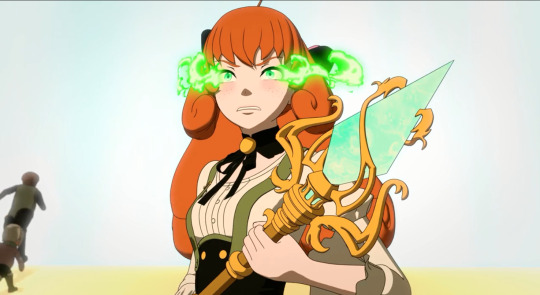
Weiss: Penny, no!
If Penny were to act as the perfect Maiden, she would have just gone to Vacuo with the staff. In this way she could have protected both the relic and the power. Even if Cinder had ended up killing all her friends, Salem would have still lost.
However, Penny decides not to act as a Maiden, but as a friend:
Penny: You wouldn’t know anything about friends.
Even the reason why Cinder manages to mortally wound her is because Penny is worried about Jaune and Weiss and gets distracted for a second:
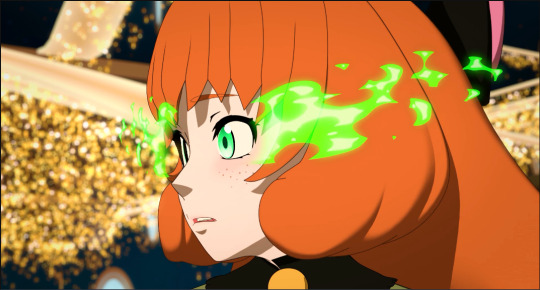
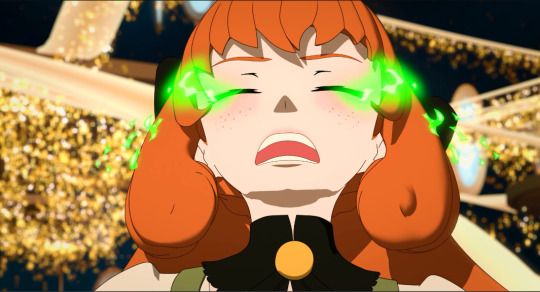
However, it is specifically in the moment of her death that Penny is able to make a choice to reconcile both who she is and what she has to do.
She chooses to protect the power:
Penny: She can’t get the staff..and the power.
And to save a friend:
Penny: I thought of you. And here we are.
Winter would have died without the Maiden powers and the same can be said about the people stranded in Vacuo. Penny saves all by choosing to be the one in control of her death.
Her choice is extremely powerful thematically and it ties together all the themes explored in these last two volumes.
1) It is a choice about trust:
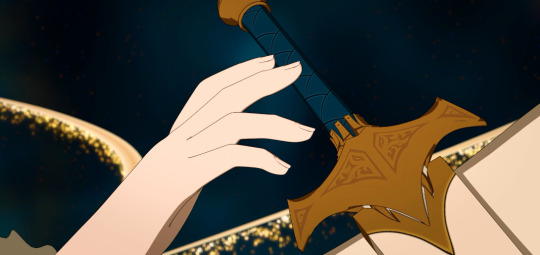
Penny: Trust me.
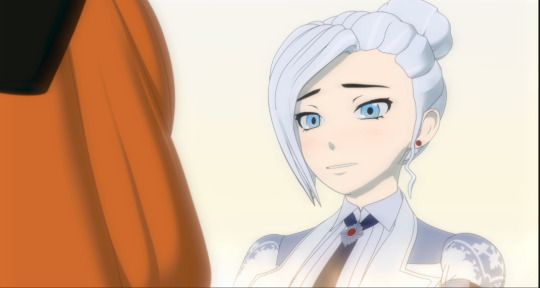
Winter: Thank you for trusting me with this.
Penny asks to be trusted and chooses to trust as well. After all, this is what friendship is all about:
Attached but not
By strings
It is a choice that uses the motif of “the part of you” in two different ways.
2) Becoming a part of someone else can be seen as a reference to the process of grieving, which is one of the themes explored in this volume:
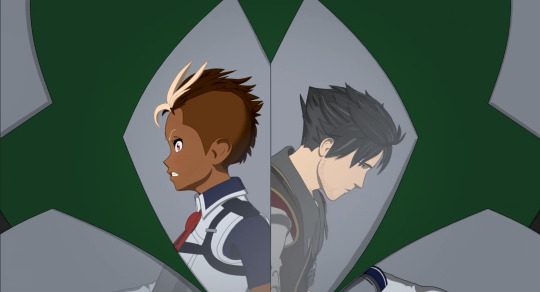
Grieving means to come to terms with your loss, to accept your feelings for the people who are gone and also their contradictions:
Robyn: Clover was a lot of things. You respected him, but I gotta tell ya, I think you’re the better Huntsman.
Vine: Then perhaps Clover was wrong too.
The lost ones will be missed regardless:
Harriet: Don't you dare! Clover was... He was...
Vine: ...Important to you.
Still, once you manage to finally grieve, you’ll realize the other person has become a part of you:
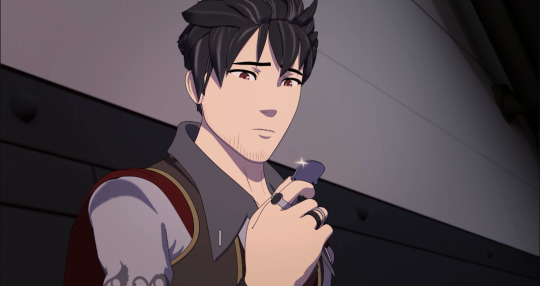
It does not matter if Qrow’s semblance has evolved, if it is a part of Clover’s power having stayed attached to the pin, both or if it is Clover looking out for them.
What’s important is that Clover will keep on living inside Qrow because Qrow will never forget him or what Clover has taught him:
Clover: You shouldn't do that, you know.
Qrow: Don't worry, I-I gave that up.
Clover: I meant deflect a compliment. Those kids wouldn't be where they are without you. You've had more of an effect on them than you realize.
Qrow should love himself. Only in this way he can stop being a self-fulfilling curse. Only in this way he can start looking at his own life with hope and wish for good luck.
Similarly, Penny won’t be forgotten and her legacy will live through Winter:
Penny: She's… gone.
Winter: No. She's a part of you now.
Penny: I won’t be gone, I’ll be part of you.
3) Penny becomes a part of Winter because Winter is finally able to do this:
Winter: But yes Penny, we must still acknowledge our personal feelings, wrestle with them. It ensures us that we're on the right path. It's what makes us human.
Winter is the one who taught Penny this, but it is obvious that through volume 7 and 8 she has avoided to face her feelings for both her family and Ironwood. By the end of volume 8, however, she is finally able to accept her emotions. She can finally follow her heart. Penny becoming “a part of her” is symbolic of this. As a matter of fact their dynamic has always been about Winter acting as “the mind” and Penny being “the heart”.
Symbolically they integrate because they both are becoming their own person even if in different ways.
Winter becomes her own person because she rejects this mentality:
Winter: Penny. The general is making hard choices so we don't have to.
Penny becomes her own person because she is finally in control of herself and her destiny. Moreover, she is able to do for Winter what Ruby has done for her:
Winter: No, Penny, you were always the real Maiden at heart. I was just a machine. Just… following orders.
Penny: You’re my friend.
She affirms Winter’s personhood and in this way she affirms her own as well.
In other words, this version of Pinocchio does not end with the protagonist being transformed into a real boy by the Blue Fairy, but with Penny transforming Winter in the Blue Fairy:

So “becoming fully human” in RWBY means to do this:
Qrow: This last great creation would be given the power to both create and destroy. It would be given the gift of knowledge, so that it could learn about itself and the world around it. And most importantly, it would be given the power to choose, to have free will to take everything it had learned and decide which path to follow - the path of light or the path of darkness. And that is how Humanity came to be.
It is about gaining knowledge, like Penny does about feelings and relationships, loving life and accepting death. Finally, it is about making a choice, even if it is painful.
This is because being human is not always simple. It can be hard:
But I found that humanity
It came with sacrifice
Having a human soul means you have a duty to do the right thing out of your own free will, like Fria’s gift showed.
Having a human body means you can experience the warmth of a hug:

But it also means you can be mortally wounded:

This is Ambrosius’s teaching.
Still, it was worth it all for Penny because she got the chance to meet friends and to feel alive:
An answered prayer
A chance to
Share the world
To be a girl
Who fin'lly felt alive
This is why her second death can be juxtaposed to her first one. Both times she was killed by Cinder. However, the first time she was used as a pawn in Cinder’s plan. This time instead she is not letting herself be controlled and she negates Cinder what she really wants out of her own free will.
In conclusion, there is this phrase by Jean-Paul Sartre:
Freedom is what you do with what's been done to you.
And I think it sums up Penny’s story perfectly.
Penny does not choose to be born a robot or to be used as a weapon. She is objectified in multiple ways...
Still, she manages to make something amazing out of herself.
508 notes
·
View notes
Text
Spotlight: Ties That Bind
This one’s a doozy folks! If you missed the last spotlight you can go read it here, but strap in for The Ties That Bind, an absolutely brilliant take on humanformers. It’s hosted here at @tiesthatbind-tf created by @artsy-hobbitses!

Q) Give us a run down of your cont! What's it about, what's it called, what's it like?
Ties That Bind is a humanformers-based original continuity which is part Science Fiction and part Alternate History where the invasion of Quintessons and introduction of their technology to Earth in 1920 sets the world and humankind on a completely different trajectory. The active narrative spans a period from 1920 to 2070, covering the First and Second Quintesson Wars, the interplanetary Antillan War (leading to the creation of Unicron on Mars) and the Great War which involves the Autobots, Decepticons and Functionist stalwarts, and how it affects the characters.
The cast is pretty sprawling and the narrative is mostly centred around human drama with bits of humor interspaced and a dash of horror (mostly centred around how the previous government often chose to utilize the technology left behind from the Quintesson Wars to create new systems of oppression, which affected many of the characters, in the name of worldwide rebuilding efforts).
Q) What characters take the lead here? Any personal favorites?
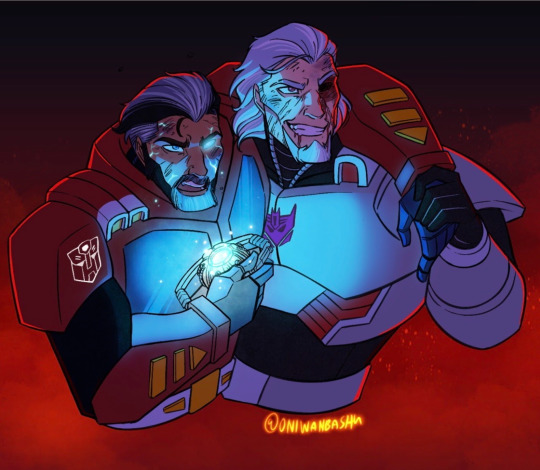
I will admit to this continuity being very much heavy on the relationship between Old Bastards Optimus Prime and Megatron, which is given considerable weight as they were best friends who had known each other since childhood and were deeply intrinsic to each other’s growths as individuals, which makes it all the worse when guilt and betrayal enter the party. Despite being captains in two corners of this battle, there’s a part of them that just cannot let go of their pasts together and they need to reconcile with how this will affect their agenda (Megatron) and how they lead their team (Optimus) who don’t necessarily share their history.
Other characters with significant development include:
Starscream, a Cold Construct in a toxic working relationship with Megatron with whom he is hiding a dark secret, who struggles to balance the underhanded viciousness he believes he needs to gain power and his innate desire from his Senate days to make the world a better place.
Windblade, a Camien native who fights her government’s apathy concerning the situation on Earth which they see as unsalvageable compared to their more Utopian society.
Prowl, a Cold Construct raised from childhood to be a cop in a police state, who finds out that he was brainwashed several times to ensure his obedience and efficacy as a government asset and is now working to reclaim some semblance of the humanity he was never allowed to feel and figure out how much of him is who he really is and how much is programming.
Hound, a sheltered Beastman who joined the fight to ensure that Beastmen the world over would have the same rights he did in his homeland of Shetland Isle, but is forcefully stripped of his humanity and faced with his animal side during the war and has to relearn what personhood means amid his trauma.
Q) Is there a bigger point to this, like a theme or some catharsis? Or is it just fluffy fun?
God with the amount of time I spent sleepless trying to figure out how the logistics of this or the semantics of that were supposed to work in universe, I cannot for the life of me say it’s fluffy fun, but I can’t exactly say it hasn’t been pretty engaging either!
There’s elements of war being messy for everyone involved where there doesn’t seem to be a clear line between friend and foe at times, but I think for most part it prescribes to Jean-Jacques Rousseau’s belief that people are inherently good, but are corrupted by the evils of society. Despite its dark themes (Including but not limited to child abuse, torture, illegal experimenation and brainwashing), love and friendships do prevail, kindness does beget kindness, found families are made, even the smallest actions matter, and things do get better because there are people on both sides who genuinely want to, and strive to make it better.
With Cold Constructs and Beastmen, it also delves heavily into what it means to be human; to have agency and personhood.
There’s also a strong undercurrent of taking responsibility for one’s actions, even if they were made with the best of intentions (Avoidance of this is what eats up Starscream and Megatron from the inside, and what Starscream eventually embraces).
Q) How long have you been working on it?
There’s two answers to this!
I’ve had a Humanformers-related universe going all the way back to 2007 around the time the first Bayformers came out---basically I had a choice between learning to draw cars or draw people (I was an anthro artist back then) and I immediately chose people.
The 2007 draft however had no worldbuilding or connective storylines and was mostly a fun little venture into character design and practice which were actually instrumental to me experimenting and learning how to draw humans properly.
I left the fandom for about a decade and when I came back to it in late 2020 around September via the War for Cybertron series on Netflix, I immediately got hooked on the 2005 IDW comics I missed out on and wanted to get around to updating my old designs as well find a way to translate several of the concepts I wanted to explore in a human sense, so the 2020 update became its own full-fledged original continuity with detailed worldbuilding and history.
You can see the artistic evolution of several characters from their original incarnation below!
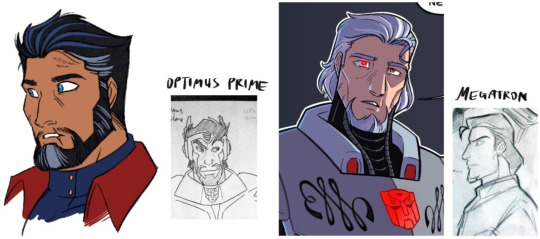


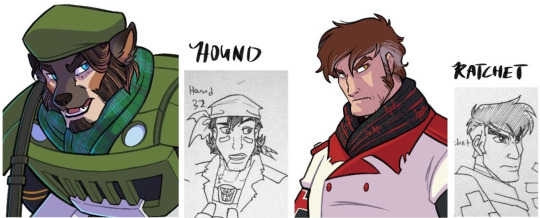
Q) It’s incredible to see your artistic improvement too! Give us a behind-the-scenes look! Show us a secret ;))

Say hello to my workspace! I’ve been working exclusively on the Ipad Pro since late 2016, which is fantastic because I can basically whip up concepts and sketches on the go anywhere. Nowhere is too out of bounds to work on TTB!

Also, do enjoy this sneak peek at true!form Rung, whose synthezoid human body took years to perfect.
Q) YESSSSS alright I must admit this is one of my favorite Rungs, and certainly my fave within TTB. Amazing. Phew, anyway. Where did you draw inspiration from? What canons, what other fiction, what parts of real life?

TTB was initially conceived as a faithful retelling of the IDW 2005 narrative before it was transformed into its own continuity and as such, it borrows heavily from concepts and mirrored plot lines introduced in that run! I chose to have the series inspired off it specifically for the amount of history and worldbuilding it introduced to the franchise.
Anime like Gunslinger Girl and Beastars inspired the depictions of Cold Constructs, especially the more harrowing aspects of their upbringing as government assets instead of children, and Beastmen (Beastformers) in TTB.
I haven’t depicted the world itself in my art all too much, but the architecture from Tiger and Bunny, which has sort of a futuristic Art Deco feel to it, is what you’d usually see in major cities. There is an in-universe reason for that---with a Point Of Divergence set in 1920 followed by 25 years (an entire generation) of progress basically being kicked to the curb due to the Quintesson wars, mankind was basically in a time-locked bubble until the end of the wars, and by then their heroes were 1920s-style rebellion leaders, which lead to 1920s fashion (especially among the Manual Working Class---Megatron, Jazz and Optimus all rock 1920s fashion at some point of their lives) and architecture being celebrated and retained as sort of a reminder of how things were before The Invasion. This anime’s background design is also where I adopted the tiered system TTB’s major metropolises are often built on (with each tier being designated to a different working class) from.
The main artistic style itself is a love letter to 90s cartoons, in particular Gargoyles’ deep and drama-driven character narratives and designs as well as The Centurions’ take on body armor logistics.

I also take inspiration, especially armor-wise, from the characters’ given heritage and background. As an example, Hotrod who is depicted as Irish has the flames on his armor done up with Celtic knots. Welsh aristocrat Mirage’s armor bears olden knight-style filigree and has his Autobot logo designed as a coat of arms. Indonesian Soundwave’s armor and Decepticon logo takes cues from Batik and Wayang Kulit while their mask is based off the Barong.
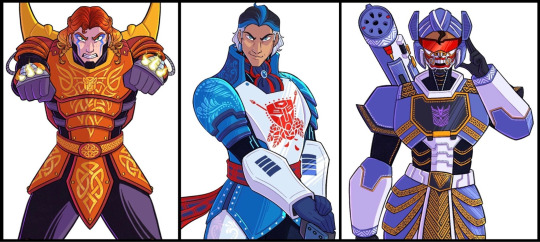
Q) They are absolutely gorgeous! Show off something you're really proud of, a particular favorite part of your cont.
The worldbuilding in general! Most Humanformers I’ve seen tend to treat it like a fun exercise which it is and is definitely valid, but I found myself wanting a full-fledged world to lose myself in and I sought to try and make that world myself by drafting a detailed history and timeline of events which would affect ongoing narratives, having indepth worldbuilding to include almost all societal aspects of the universe and expanding on the concept of Beastmen and Cold Constructs existing in a human setting.
I’m not so secretly proud of the research and diversity included to make the cast look like the multicultural, globally-based team that they were meant to be instead of being locked to a single region! My original draft from 2007 was, to put it simply, quite culturally monolithic and I wanted to improve on that aspect with TTB.
I’m also proud that I’ve kept to it this far! I’m a notoriously flaky person jumping from one idea/fandom to another and to have kept at this continuity for the better part of ten months is honestly a personal feat.
Art-wise, this scene depicting a young Megatron working alongside Terminus and Impactor (cameo by @weapon-up-wallflower‘s OC Missit!) is definitely one of my favorites since it helps build up the world they live in and plays to familial bonds and comfort found in one another despite their less than ideal circumstances.
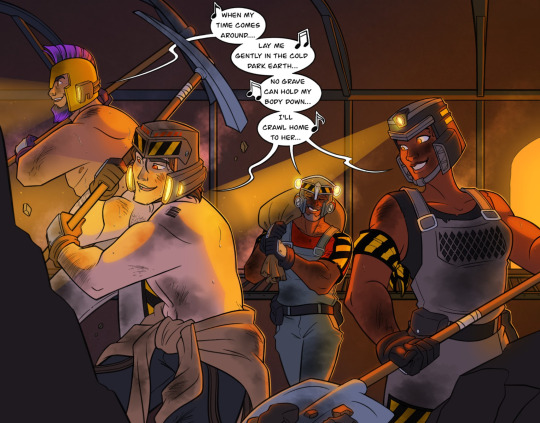
Q) Everything has come together so beautifully, you absolutely should be proud. What other fan canons do you love and why? Would you like to see them interviewed?
I am dying to hear more from @iscaredspider’s Sparkpulse continuity! Her designs are MIND-BLOWINGLY GORGEOUS and I want to hear more about what inspired her to work on it!
Also YOU. Yes YOU BLURRITO. LET ME HEAR MORE ABOUT SNAP.
Q) [wails and squirms away in the mortifying ordeal of being known but in a very flattered way] I WILL SOMEDAY I PROMISE aflghsdjg thank you QwQ
Well that was fantastic, Oni, thank you muchly! A magnificent continuity with so much to look forward to! Coming up next is another personal fave of mine, the first inspiration for SNAP, so stick around...
#long post#gore#ties that bind#spotlight#transformers#HUMANFORMERS#transformers au#tf original continuity#transformers fan continuity#transformers redesign#maccadam#i said id post this on sunday but i realize thats a holiday for lots of folks on this site :/
352 notes
·
View notes
Note
hello! i hope you don't mind a message, but i am just excited to see someone else who liked AMCE and would love to know if you have recs for books that are similar, because i've been thinking about it for like a month straight since i finished reading it and would love something else to occupy my brain the way that it did. no pressure to answer ofc, just happy to share good vibes over a book :)
I do not mind it at all! <3
I do have some books that scratched a similar itch as A Memory Called Empire! I looooved the thoughtful focus on culture and language and identity within an intricate setting, so these recs follow that pattern somewhat.
Under a cut because this got kind of long.
The Imperial Radch trilogy by Ann Leckie
Liked the exploration of culture, identity, and imperialism in AMCE? You will probably like these books, since they also grapple with those themes. Also present is the exploration of personhood, who has it, and who does not -- because our main character is a person who used to be a starship. Or well, sort of. Wikipedia has a decent blurb:
The novel follows Breq—who is both the sole survivor of a starship destroyed by treachery, and the vessel of that ship's artificial consciousness—as she seeks revenge against the ruler of her civilization.
These books are honestly some of my favorite books ever. They combine a really thoughtful and deliberate focus on all the stuff mentioned above, fascinating plots and world-building, and characters who absolutely made me Feel Things. Highly recommended if you like, say, emotionally closed-off and damaged characters learning to care and be cared for while also skillfully navigating an intricate web of power to pursue their goals and reckon with the harm they've caused. But with bonus smart thoughts about robots.
The Foreigner series by C.J. Cherryh
I haven't fully made my way through this series, but it's rewarding every time I sit down to read another book. The books follow Bren Cameron, diplomat to an alien court, as he negotiates the intricate web of politics and intrigue involved in making sure the crash-landed colony ship he represents doesn't get obliterated or obliterate anyone else, despite humans making some monumental fuck-ups in the recent past.
And when you live and work and eat among one people, how much do you really belong to the people you came from? Of course, neither side really trusts someone who straddles both worlds, and to cap it off, the atevi people he lives among are different from humans in a fundamental way: they have no word for friend or love because those are alien concepts to the atevi. They do not feel such things. Instead, they live by an intricate web of obligation and favors. Trust is something a little more practical and a lot more deadly, for the atevi.
But these are not heartless novels -- part of the joy is watching the main characters grow meaningful relationships, even though the form is fraught and strange and never quite means the same thing to the people on either side.
If you like slow and thorough explanations of culture where meeting with your friend's grandmother is a potentially perilous activity (because the tea might be poisoned, because she might take you on a hunting trip you won't come back from, because she's a formidable political power and might be trying to assassinate your friend, because your friend might know all of this and have sent you anyway, also your friend is the king) these are books you might like.
The Goblin Emperor by Katherine Addison
If you like deep dives of culture, language, identity, and loyalty within the deadly intrigue of a fantasy court, I hiiiiighly recommend this book. The book follows Maia, the youngest and least-favored heir to the throne who gets unexpectedly crowned when everyone else in line dies and must quickly learn to survive the cutthroat politics. But Maia isn't cutthroat by nature; he is kind and must negotiate how to keep that kindness in the face of pressures that would be easy to solve with cruelty, as well as people keen to take advantage of what they think of as a weakness.
This book'll hit you with a lot of fantasy language at first (it's a focus of the book), but if you stick with it you'll be fine. You're learning all this intricate court language at the same time as our protag; he too is a little out of his depth at the start.
Steerswoman series by Rosemary Kirstein
I dearly want to go back and read these -- it's been a few years, but they absolutely sucked me in. The books follow Rowan, a steerswoman, as she tracks down the mystery of a strange and incongruous gemstone. In-universe steerswomen are basically traveling scientists and naturalists who have taken an oath of truth.
The books start out in what seems like your fairly typical Standard Fantasy Setting with wizards and dragons, but as Rowan learns more about the strange gem, it's clear that this Standard Fantasy Setting is...not as it seems. There are three things that I loved about these books: the sense of wonder and discovery as our fantasy scientist protag reasons through problems and begins to discover she lives in a sci fi world, the interesting relationship between the main characters, and the excitement you as a reader have when YOU realize exactly what mysterious object Rowan is describing and what the implications of that are for the setting.
The Broken Earth trilogy by N.K. Jemisin
Riveting series -- brutal and beautiful. Straddles the line in some respects between sci fi and fantasy. Follows characters who live on a far, far-future Earth plagued by catastrophic climate events called "Seasons" that last generations. There are some people born who have power drawn from the earth; these people are alternately hated and ruthlessly trained to hone their powers to attempt to prevent another Season. (This sort of sounds like the setup to a YA coming-of-age novel, but it is really really not.)
The world and fantastical aspects are fascinating (cyclical post apocalyptic societies! geology magic!), and the books themselves explore family bonds, racism in both a personal and systemic sense, and broken systems and the wounds they leave upon the people within them even as those people wound others. The series is not a light read, but it is a good one.
Literally anything by Ursula K. Leguin
All of her work could be recommended if you liked AMCE. Her writing spans fantasy and science fiction, and includes thoughtful and moving explorations of some similar ideas: culture and cultural exchange, gender, different societal setups, you name it.
If you're looking for a good novel, The Left Hand of Darkness is a classic for a reason. If you'd like a sample platter of interesting short stories, The Birthday of the World and Other Stories is wonderful.
#book recs#i had to trim this list down so you know... i got more recs where this came from#like#anticapitalist books about Personhood & a killer robot who just became A Person; robot is in a committed not-relationship w a cargo carrier#a book from the POV of a god who is a mountain watching society rise and fall around it. but other gods do more than just watch...#books about greek gods making a bet & stealing 10k children to form a philosophically perfect society outside of time. 3rd book set on mars#scifi books about an alternate history of the US space program if an asteroid struck Earth in 1952 - as told by the first female astronauts#a book about the messy relationships between you - a body-hopping parasite - and the people whose bodies you steal#a book about a colony ship that lands on a planet full of plants they do not realize are sentient and predatory - as told over generations#a book about a colony ship that lands on a planet where ancient terraforming accidentally uplifted spiders instead of primates#AND MORE!#asks#burningdarkfire
75 notes
·
View notes
Text
I recently watched 1x10 for the pod and realized just how much of a peek-behind-the-curtain episode this is for Shigure. The episode does a great job breaking down Shigure’s motivations, agenda, and objective as well as exploring some of his morality and self-perception in a really subtle and nuanced way. I wanted to break down what exactly was said in the episode and what the subtext is showing us about who Shigure is and what he wants: an obsessive man who puts his selfish desires first, always, all while trapping himself deeply within the very curse that he is trying to break.
Motivation: The Dream

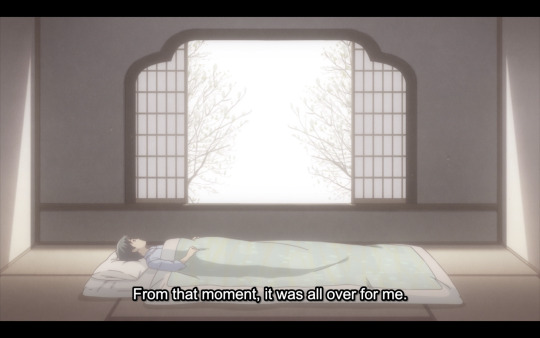
Each zodiac’s curse manifests in different ways. For example, Yuki experiences the curse through the lens of social isolation and self-blame, Kyo through familial rejection and projected blame, Hatori through resignation and grief, Ritsu through extreme guilt, etc. Shigure’s manifests as obsession.
This dream was something special to all of them, but it soured over time. The anime implies for Hatori that it was because of Kana,
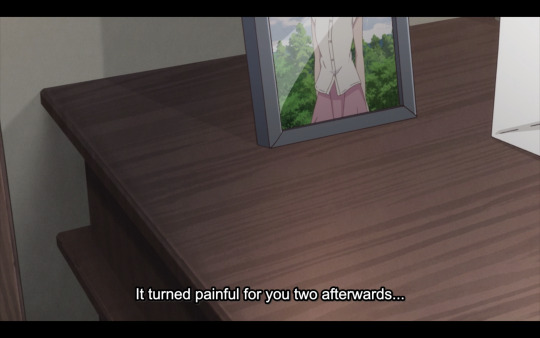
but I believe that was the last straw in a haystack of crushing oppression for Hatori (see: having the ability to erase memories and being expected to carry out the task no matter who it hurts by the family as a whole, Akito, and his father, who also had this power). As for Ayame, he does not fit in with the Sohma’s traditionalism and conservatism and he never attempted to do so, and as an adult he has done everything he can to divorce himself from the Sohma image—going into a non-traditional and arguably taboo field of work, moving away from the estate, and keeping secrets from the family, even his own brother. Kureno is a special case and Ritsu was too young to remember this. For Shigure though, he became obsessed with this feeling, and because he didn’t have the bad experiences Hatori had growing up or chafe too hard against the family culture like Ayame, it became a life-long obsession that, over time, shifted from chasing that “feeling” to chasing Akito as an individual.
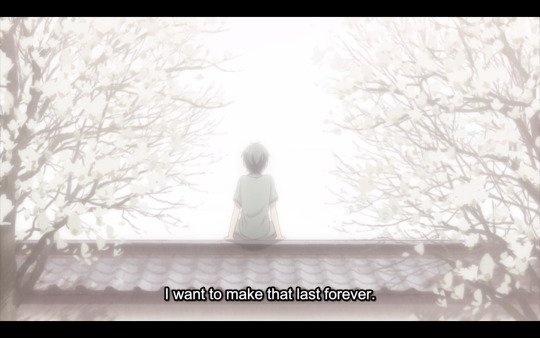

A note about the Dog: The Year of the Dog’s defining trait is loyalty, but they are also notably stubborn. This doesn’t speak to the authorial intent (Takaya added the zodiac aspect to the story late in the game, after their characters was set), but I also think that Shigure being the Dog is a great indicator as to why, out of everyone, Shigure’s curse manifests as obsession, and why he’s in love with Akito despite Akito’s treatment of him, the other zodiacs, and other people as a whole.
Agenda: Emotional manipulation
Shigure believes that the curse has weakened over time. The dragon was apparently not always a seahorse, which implies that the magic is weakening, and this is the first time in a long time where all of the zodiacs have been alive at the same time. Due to this as well as their closeness in age and the agitation present between Akito and the zodiacs, Shigure thinks that this is the curse’s last hurrah before breaking.
Shigure wants to speed up the process by exacerbating what he believes to be an already unraveling curse by turning the zodiacs against Akito, showing them that their lives have meaning and potential outside of the curse, and influencing them to start questioning the narrative around the curse as a whole as well as the ones around each of their individual zodiacs.
The curse’s most obvious effect is the physical one, but the emotional component is arguably much more significant. This is why Shigure is agitating the zodiac’s emotions. He often says things he knows will hurt them, but instead of hurling insults like Akito, what he says challenges the zodiac’s beliefs about themselves, one another, the curse, and Sohma family as a whole. He is aiming for their internal lives and beliefs in a way that makes his meddling seem almost invisible; he manipulates through influence instead of force, orchestrating it so that the zodiacs feel as if they have come to a new conclusion on their own. Here is how 1x10 shows us that tactic:
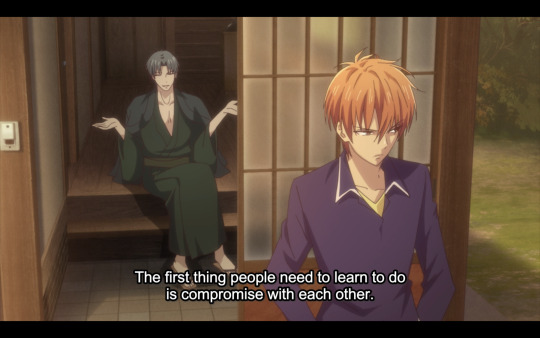
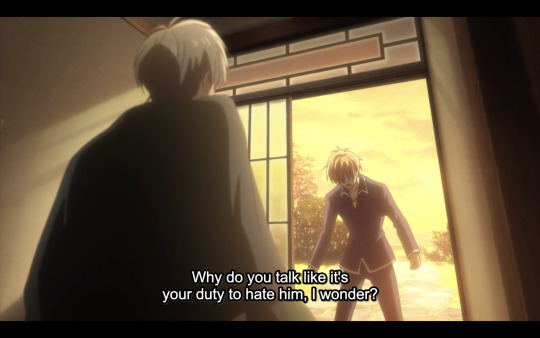

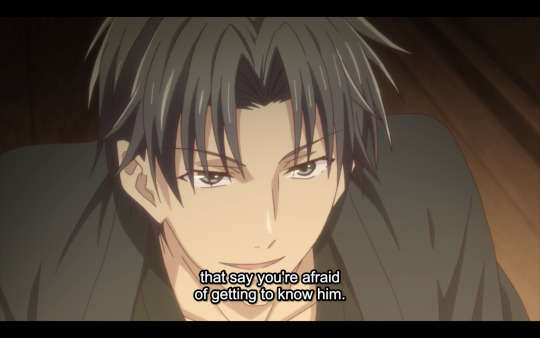
Shigure is trying to push Kyo into realizing that his feelings for Yuki are more influenced by the Sohmas than he thinks they are (implication of the word “duty,” that it’s not something Kyo chose for himself), and that if he takes a step back from the situation that he might see that him and Yuki have more in common than he thinks (”afraid of getting to know him”).
However, this doesn’t work, and it’s directly because Shigure has known who he is and what he wants since childhood. He has never had to struggle with his own personhood, identity, isolation, and blame the way that Kyo has—not to say that he hasn’t at all, but not to the extent of the Cat. Shigure logically knows why Kyo hates Yuki, but he can’t put himself in Kyo’s shoes because their experience with the curse are too different; Shigure fully embraced the curse, falling into obsession over it and making the choice to permanently attach himself to Akito, and that decision is rewarded for the most part. Kyo, on the other hand, has spent his entire life being rejected and ostracized by his family as well as being scapegoated for things he had no control over. Kyo’s issues with blame and isolation are not something that Shigure can empathize with, leading him to get frustrated with Kyo’s stubbornness and pushing Kyo too hard before he’s ready. All in all it’s not bad advice, but Kyo’s issues run extremely deep, and Shigure got impatient. This scene is Shigure messing up, indelicately going to the heart of the matter because his timeline of events is moving slower than he bargained for, and he accidentally shows his hand because of it.
Objective: Akito
Shigure’s objective is to be on equal terms with Akito and pursue a real relationship with them. The only way to do this is to break the curse, freeing Shigure from Akito’s power and taking Akito’s command over him away, as well as undermining the importance of the other zodiacs in Akito’s life.
The anime does a nice job portraying this to us subtextually by visually juxtaposing the relationships that are the main focus of this episode:

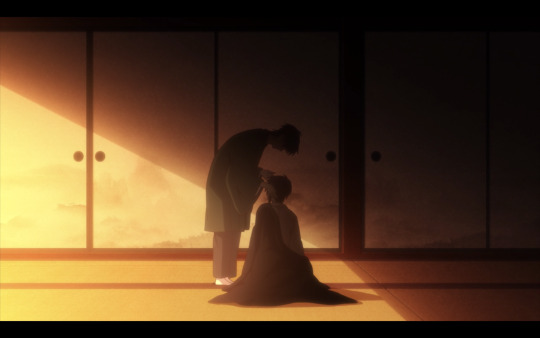
Tohru lowers herself to meet Kyo where he is, whereas Shigure positions himself physically above Akito. The former is a relationship built on equality and mutual trust, the latter one on an inherent and unavoidable power imbalance, resulting in jealousy, toxicity, and a constant struggle for power.
At first glance the shot of Shigure and Akito would imply that Shigure is the one with the power due to their positioning, but it is Akito who has the power. Akito doesn’t stand up to greet him, simply expecting Shigure to come to them and bend at the waist to accommodate their position. Shigure tries to assert his power here by being physically larger and looming, but Akito is so confident in theirs that they wordlessly watch as Shigure does the exact thing Akito wanted.
Morality: Always looking out for #1
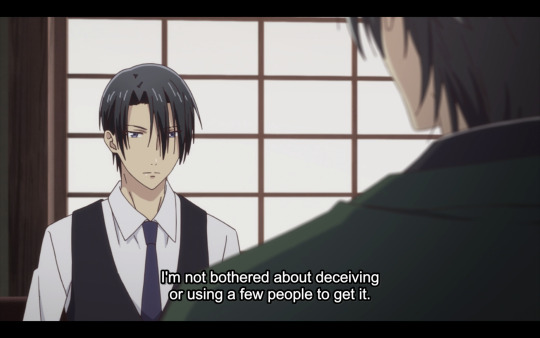
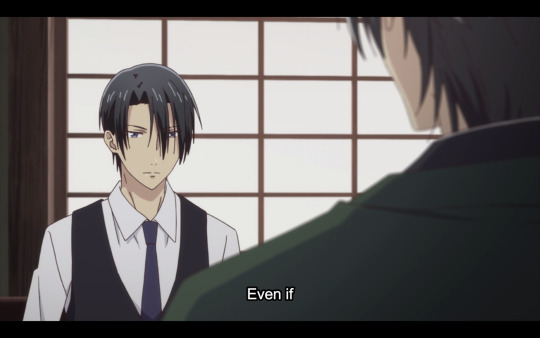

Shigure’s goal is a selfish one, and he has leaned into that completely. He is gloatingly self-aware, which allows him to further his plans without any moral qualms in the way.
The inner circle of the Sohma family has a strong culture of pervasive cruelty. We see it over and over again—Kyo’s treatment by the people around him, Haru’s, Yuki’s, Hatori’s, Rin’s, etc etc. Cruelty is extremely normalized within the family, and you can see even in this fairly casual conversation that Shigure and Hatori take shots at one another (other scenes where this happens between them include 2x7, 2x25, off the top of my head). The line of what is deemed “acceptable” in a larger societal sense is much farther for the Sohma family, and this greatly influenced Shigure’s sense of morality and decency. He is intelligent enough to know that hurting others is wrong, but it’s what has been modeled for him his entire life and something he’s participated in before for various reasons. Hurting others is normal for him and of a small blip in his radar in the grand scheme of things.


Shigure’s morals are warped, but he is also extremely intelligent as well as in touch with his emotions. He is aware that if Tohru gets hurt that it will hurt him in turn, both because she is an outsider whose life he is playing with and because he can’t help but care about her (which is what makes her so good for his plans), but his end goal is overall more important to him than his or anyone else’s emotions in the moment.
Self-perception:
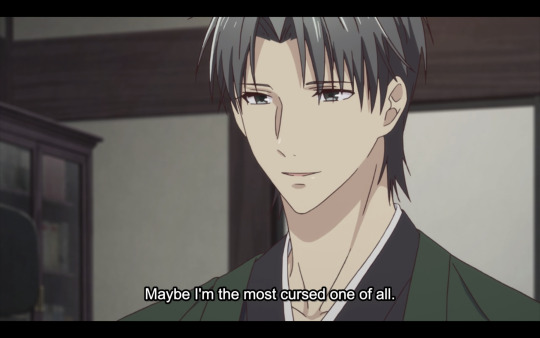
All the other zodiacs hold some level of resentment towards Akito and the curse, but Shigure doesn’t resent Akito. He resents the curse because it’s standing between him and a real relationship with Akito, but not Akito themselves. Since childhood, Shigure has been unapologetically obsessed with Akito, and the power of that obsession and the intensity of the bond has led Shigure to live a one-track life, disregarding the pain of people close to him to feed his own selfish desires, going so far as to willingly dirty Tohru, an outsider and a child, to enable his plans. The others live in misery that has been forced onto them; Shigure picked his poison and never plans on letting it go.
Conclusion: Shigure is a nasty little man
1x10 is an excellent look into Shigure’s inner life and ultimate goals. It very clearly shows us that he is motivated by a love that was initially the pure love of a child-turned-dark and desperate. His motivations are selfish, his actions hurtful and oftentimes callous, and his morality twisted by both the family culture and his own doing. This episode does an amazing job juxtaposing Shigure’s unique relationship with the curse against Kyo’s as two ends of the extreme: the former is trying to break the curse so he can have an individual, the latter desperate to be included in the curse so he can find acceptance from the group. Shigure is an underhanded character who very rarely says what he wants outright, but the subtext of this episode is full of great little moments to spell out what Shigure’s game is and how he plans on winning it.
#shigure sohma#fruits basket#fruits basket 2019#fruits basket reboot#fruits basket meta#meta???#takes a huge bong rip
141 notes
·
View notes
Text
what i like abt muren and li chen
i’m sorta burned out and my vagina is bleeding so lemme see if i can type this. probably can lmao. my brain is going ten miles a minute.
1. the fact that they were friends first.
someone on here said this and idk who but i don’t want to seem like it was my idea.
the fact that they are friends and didn’t have like a connection previously and it developed. most times friends-to-lovers has a basis of some sort of romantic interest from another person so they were not truly ever friends, you know? and many relationships people aren’t friends first but that’s the best kind. and they are the truest form in that (i wouldnt say truest means good but just i think a representation of) they were truly friends, no attraction at least consciously, and were lead into it.
2. bc they know each other well and are friends they know each other and LAUGH and if you can’t laugh with your love then there is no point. 0. lmao. i love it
idk they fell easily in2 the luvy duvy part and u can actually believe they are into each other like outside of kissing. gee. also hello! when lichen like threw the heart in the office and muren caught it? bitch! i woulda been like ew!!!!! and blushed but muren was like that’s right that’s my bitch
3. bouncing off 2 um uhhhhh the way they interact so i guess this is 2 but whatver i like lists now
muren is >:O but super sweet and receptive to others. so he responds to people and it isn’t just stoic for stoic sake or with not much substance. idk how to say this but oftentimes sometimes i feel like characters will be too oppositional to offset their partner and it can be extremely annoying to watch because it’s part of the dynamic but sometimes there’s a lack of reciprocation. i like that even if muren is quiet he smiles a lot and lets people know through his actions and shit. esp his mans. and when he needs to talk, he will.
lichen is perfect for this because of reasons. what do you even say about this dude holy shit. first of all he really is a fucking himbo. he’s not even dumb he’s just a fucking himbo. it’s great to say the way they express their excitement and the best thing to hear, “i can be myself around you”
4. u cannnot tell me that this top/bottom discourse is actually not ridiculous esp for them bc there is no way that my eyes are seeing what i see yet there’s some struggle when they’re trying to constantly grapple with the masculine/feminine aspects (this is a good thing)
with the way that they hang off each other. esp bc lichen is shorter than him and stockier and he can attach himself like a barnacle. the way he expresses glee and love is very “feminine” at times IE reliance, support, putting your head on his etc but then there are times when he is the one to hold muren too. so it’s like they are clearly on the same level in how they exchange love and stuff and exploring the dynamics but it clearly isnt as structured as the usual ones and it shouldnt be so they should just stop talking about this shit cos ur both getting fucked god shut up
lichen squeals like a girl and is obsessed with him. he is clingy and also says “what do you want to do to me.” if this show is gonna sit us through the agony of this stupid discourse and they tell me they arent gonna sw*tch or whatever (not that they cant have other forms of sex bc that is not that difficultand as adults w eknow this but anywaaay) then they simply are wrong
5. the ~gay 4 u~ thing is dumb and i cannot believe it tbqh cos it’s like sir....but i am glad that lichen like expresses attraction to his physique and personhood as a man and acknowledging that that is something and a part of the attraction.
it was probably a happy accident but it’s still a good one. there’s sometimes an idea of like sexual attraction being sorta nebulous when someone is like getting into a rship with the same gender but not being sure about their sexuality or whatever or still liking another gender explicitly where they cant admit they find things attractive or enticing even when they are in a same sex relationship and it is so fucking confusing and doesn’t make sense. i wish instead of trying to make it cut and dry they just went honestly mabye they dont know but theyre both men and thats a factor. ok lets move on now. :)
6. they make u feel nice
especially in comparison to the show being messy and also there’s some crazy stalker man running around you know they temper that
they’re just really fun to watch. it’s an interesting dynamic and particularly with xing si in their lives it’s nice and i’m so glad there’s no one else to ruin it like say a brother who is a waste of space. but it’s mostly good feelings for them and you can see why they like each other, that they can stay together, and how helpful a relationship can be as you grow as an individual
7. while i am sure there will be further misunderstandings...comm...unic...ation?
literally boys are dumb as hell but idk if my reading is correct on this one but SO FAR TO MOI im like wow u guys like actually talk. woah. and i think that’s nice. yest i had a breakdown in front of my fam bc i am sometimes emotionally stunted when faced with distress so it’s nice to see people talking that out in particularly with like jealousy and stuff
AND their interactions in public and the understanding. knowing it takes time and stuff for them to adjust and allowing them the time. they are extremely different to other people and they want to be distinct and they can be and arre to each other they dont need to follow anyone else’s rules (except the costume department sometimes needs to get better pants for muren like that’s my rule tbh but that’s neither here nor there)
did some1 call them emotional support himbos? i think so cos word.
oh one more thing idk the name of the actor playing li chen and im too tired to look it up but i like him a lot i think he does a good job of going seamlessly between like a jubilant person and an actual human being. he plays well at being oblivious but not outright stupid and emotionally stunted or not picking up certain signals. i think at times it seems like he doesn’t always have a sense of self like trying to be something else for other people but then he realizes like he can’t do that so all he can do is be himself which leads him 2 his mans but yea. the actor does a decent job! it’s a fun character to wathc
27 notes
·
View notes